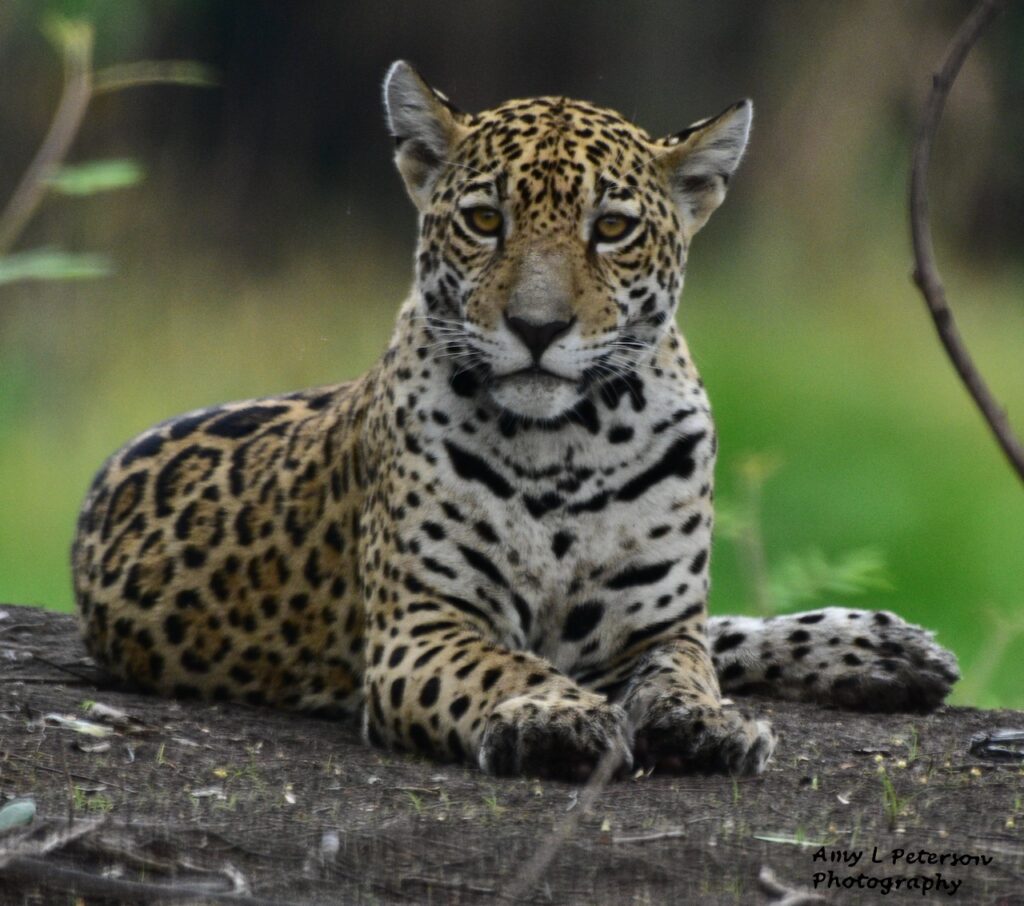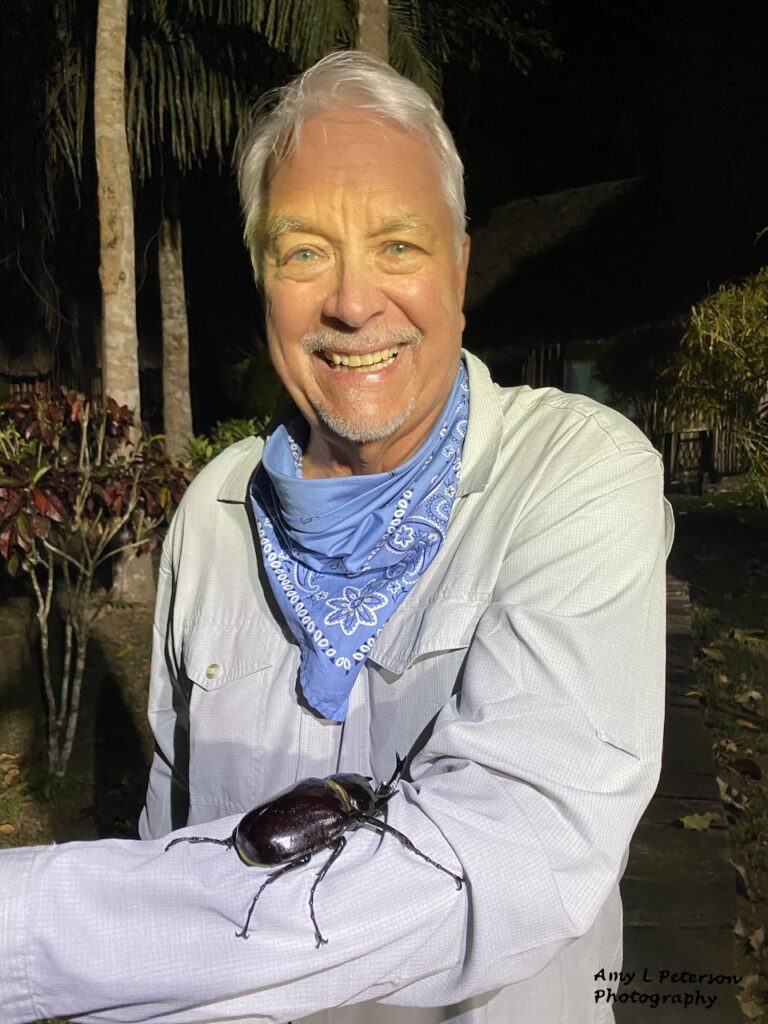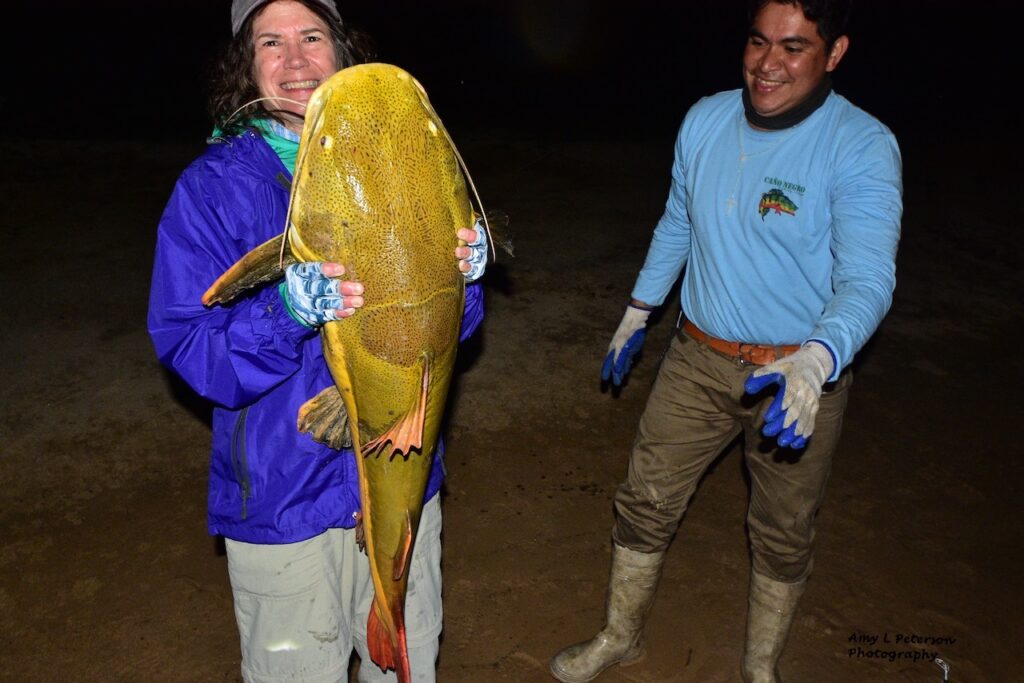Friday, September 2, 2022. I awoke in need of aspirin to help me un-fist my right hand, the tendons for which had tightened like overly tight guitar strings. As I found humor in the difficulty of opening a bottle of aspirin when one’s hands are in pain, I noted that sunlight came into the room like it had every other morning, but on this morning, it felt like a little cloud had formed in our room–a cloud made up of sadness mixed with a bit of grumpiness and topped with a little nervousness about the ride ahead in the tiny airplane.
But that is getting ahead of today’s story.
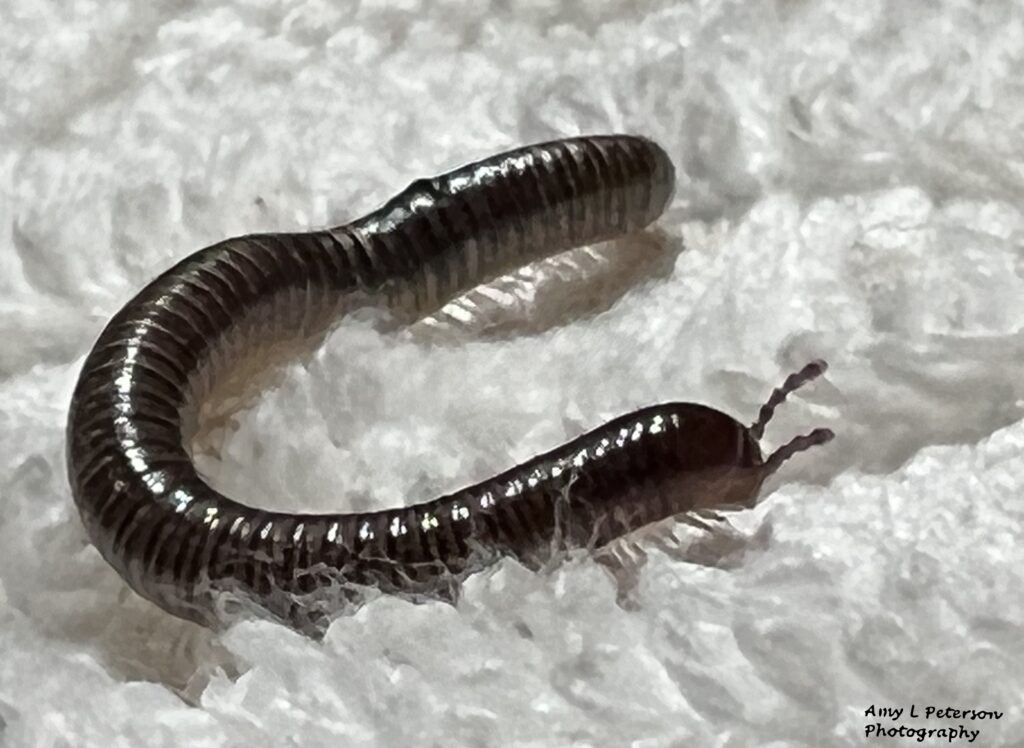
Instead of a frog on the wall of the bathroom this morning, I found a millipede on a white towel on the bathroom floor. After I dried off–yes, with another towel–and got dressed in front of what was surely a boy millipede (because he watched me the whole time)–I carried the towel with my millipede friend on it outside, and, per Mark’s instructions looked for a damp place a millipede might like. I had heard the drip, drip, drip of the air conditioner outside since we’d arrived, so, turned the towel over near the puddle under the air conditioner and wished our wiggly well a good day.
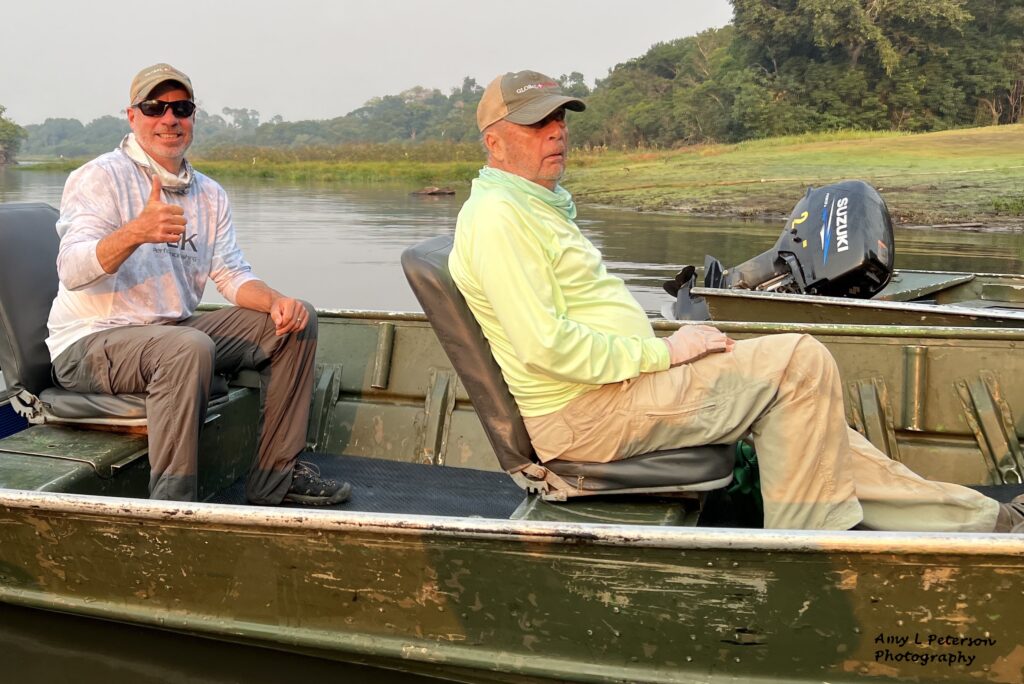
On the last day of every trip, I take photos of people and scenery I didn’t capture previously. Above is Drew and his father, John. To the right is Drew’s brother, John, who is also John’s son John.
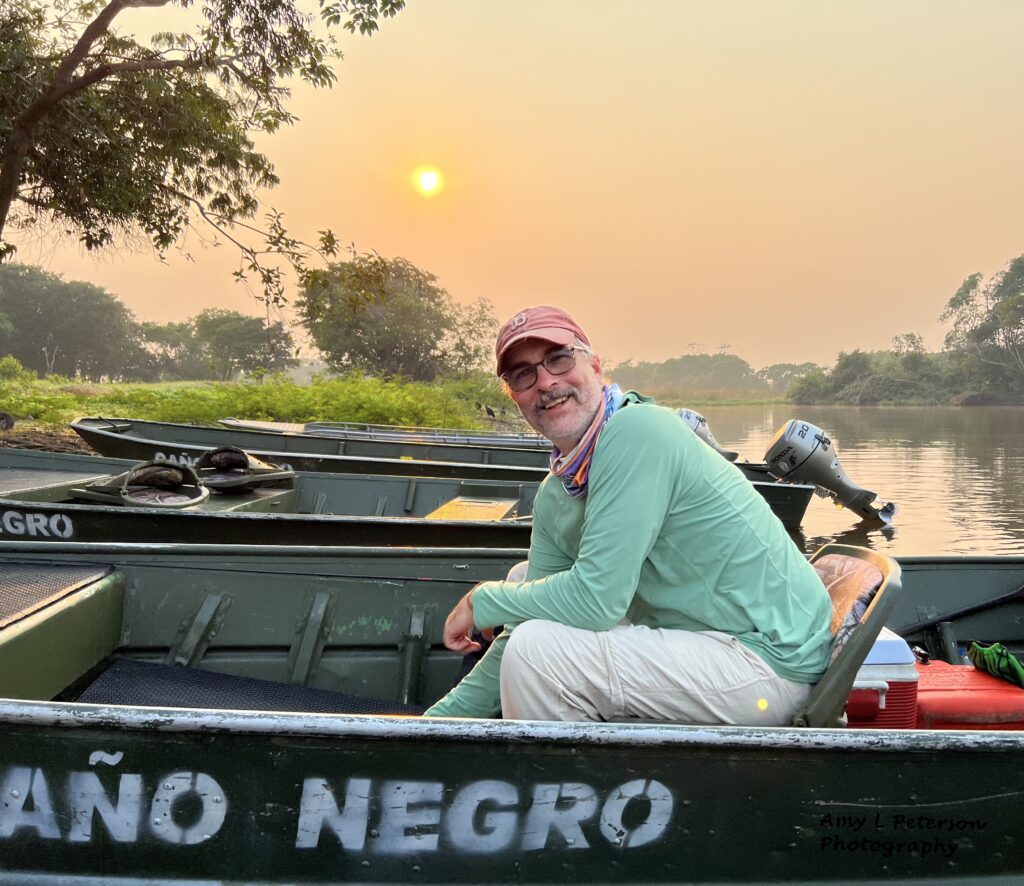
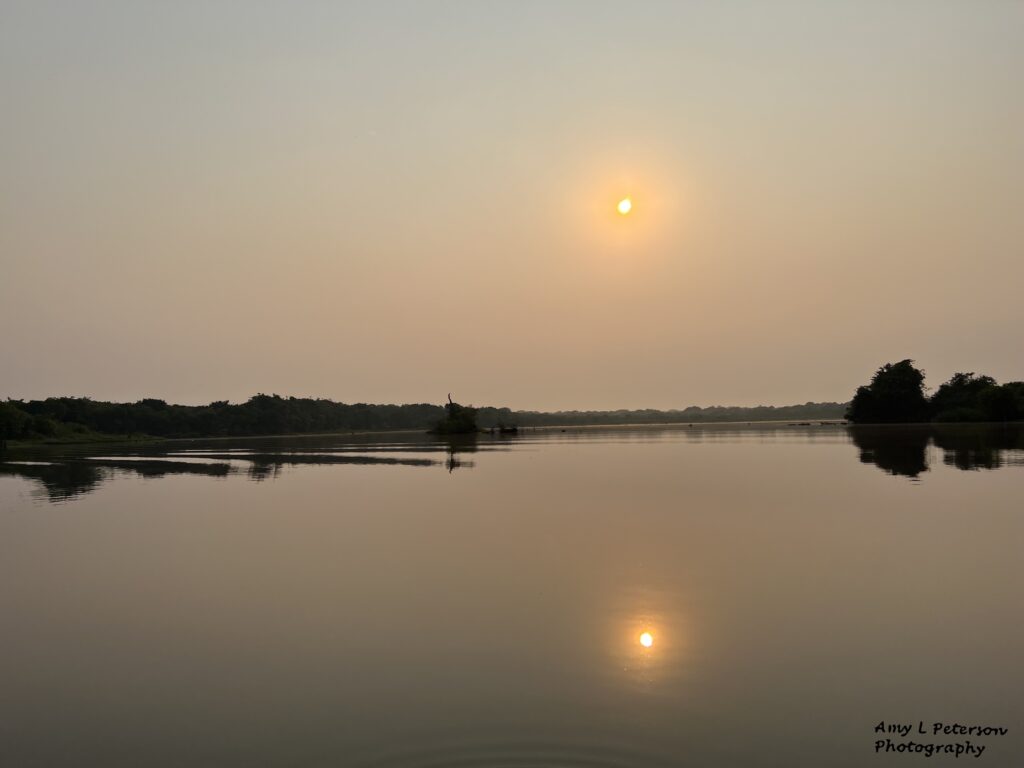
As lovely as the day started, though, once we got to our first spot on the river, things got ugly. Because Someone only brought one lightweight leader for his rod while Someone Else had to use super stiff leaders leftover from vampire fishing. That meant that Someone had an easy time using surface baits and catching fish, while Someone Else had to keep her rod tip way up in the air and twitch it just so to keep her surface bait from sinking below the water due to the weight of her leader (which made her forearms burn). To repeat an earlier tip: take lots of a variety of leaders on a trip to Bolivia. And the corollary: don’t count on someone else–I mean Someone–to bring leaders for you.
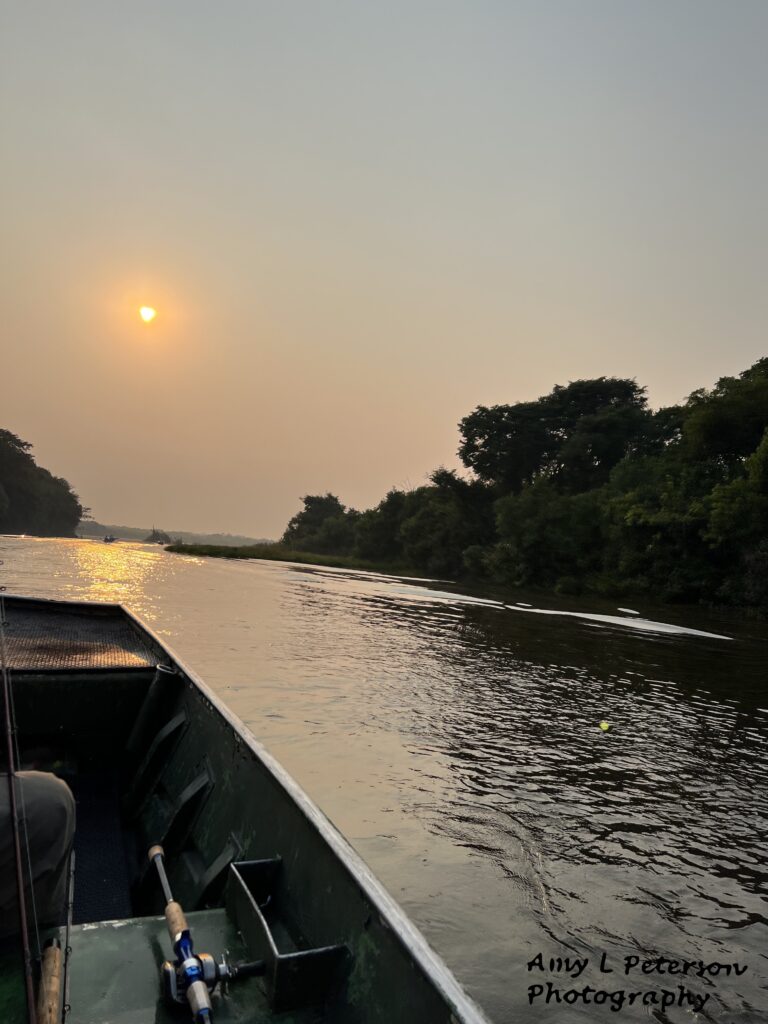
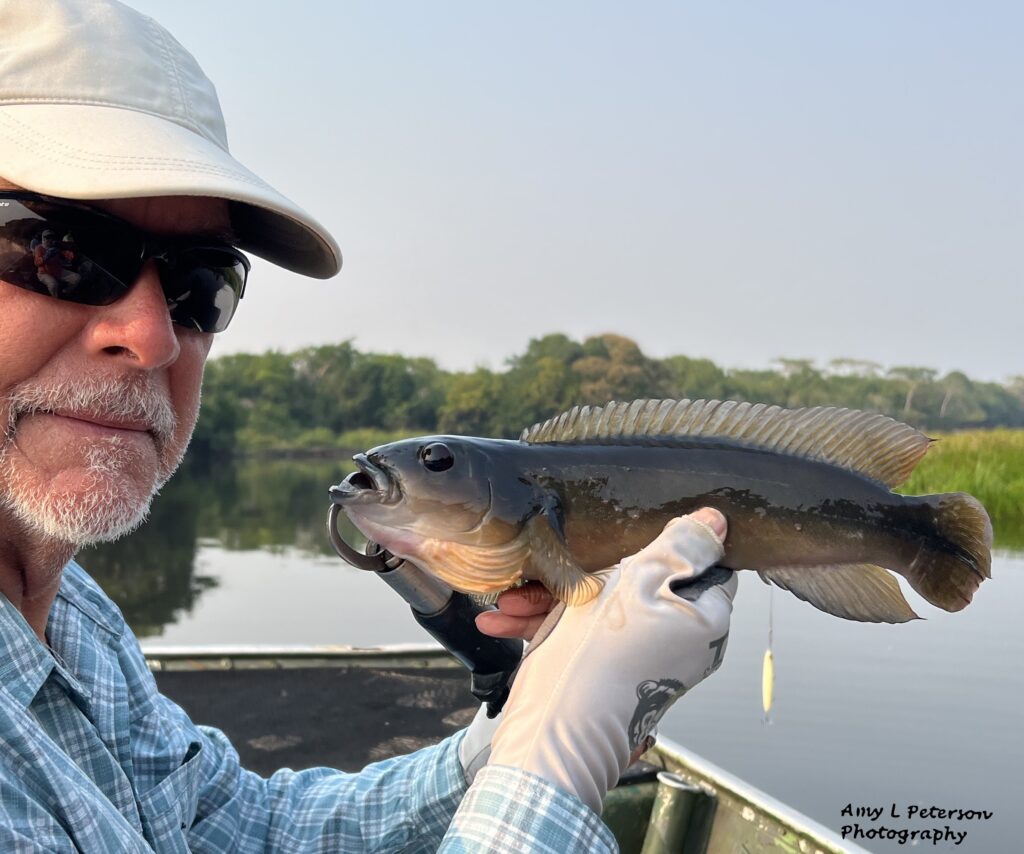

So, guess who caught more fish during our final two hours in Bolivia. Yes, Someone.
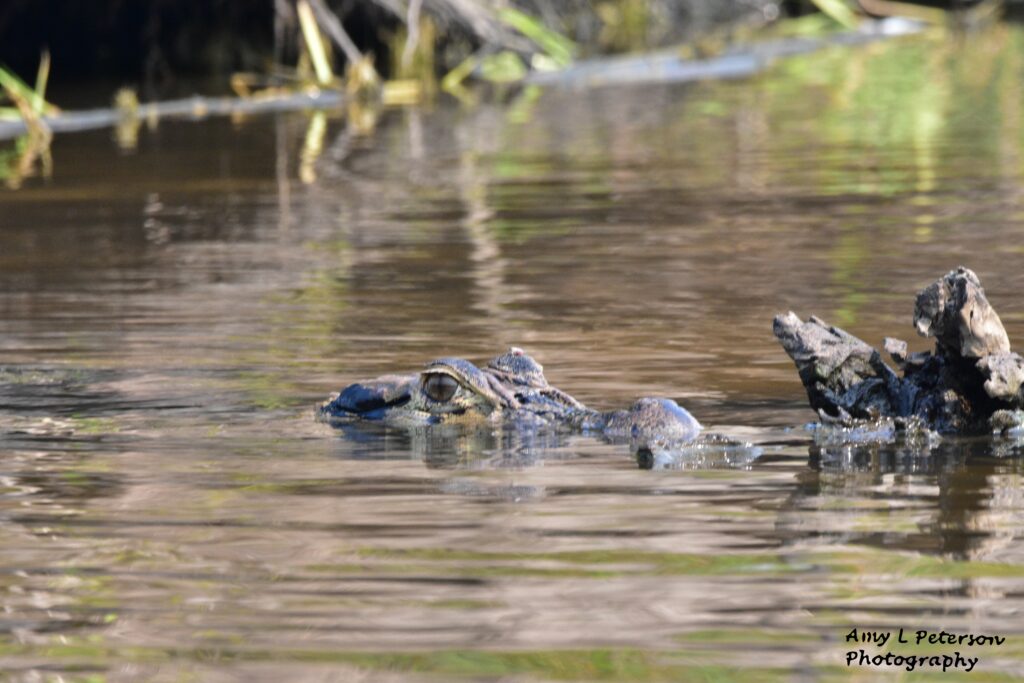
The best part of the morning was when Someone Else got her surface bait caught on a tree stump and a caiman took a swipe at it with its mouth, the caiman missed and somehow dislodged the lure from the stump. As Someone Else reeled the lure back in, the caiman followed closely behind but didn’t get the lure.
This is a ‘lil bicuda pal, which was the last fish Someone Else caught.
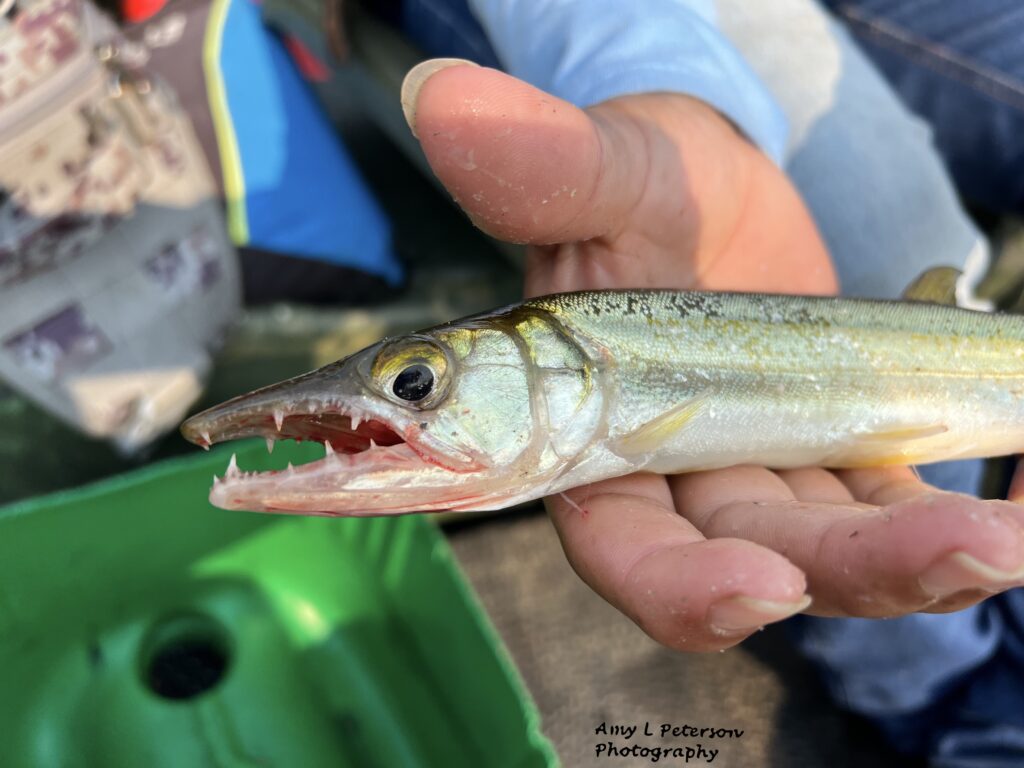
Two hours after we started fishing, a guide came out in a boat and told us we had another hour to fish before we’d have to go back to pack. Someone decided that since we had brought our own rods and reels and lots to pack, it was time to head back.
Someone Else was grumped, and will never admit that it took 45 minutes to pack everything back into our bags and that it was a good idea that Someone suggested we stop fishing early.
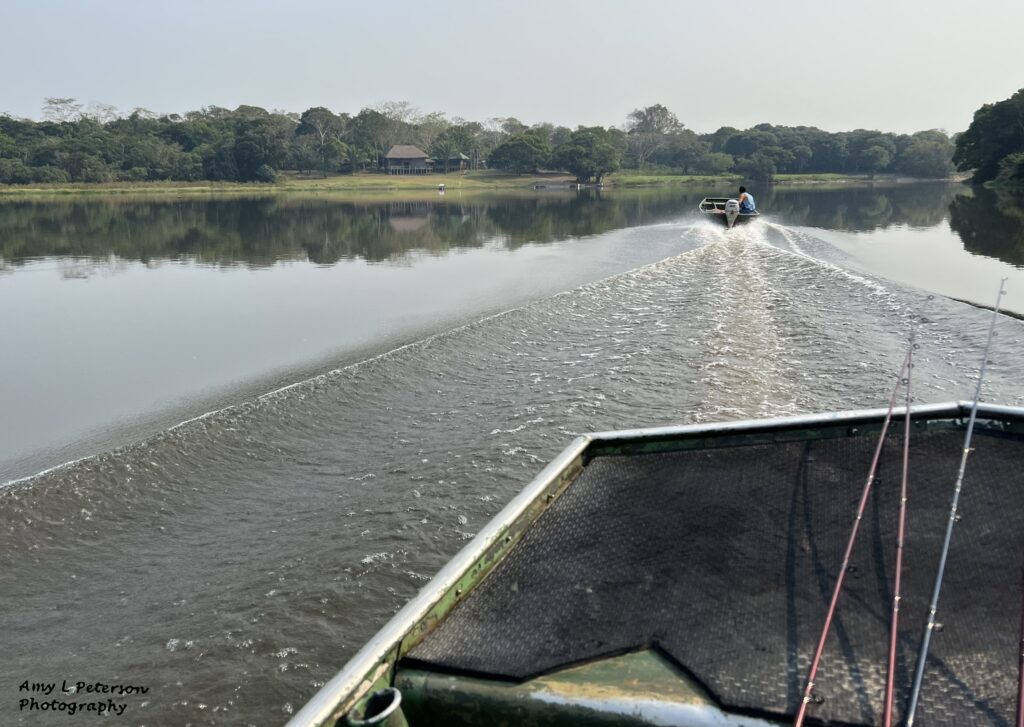
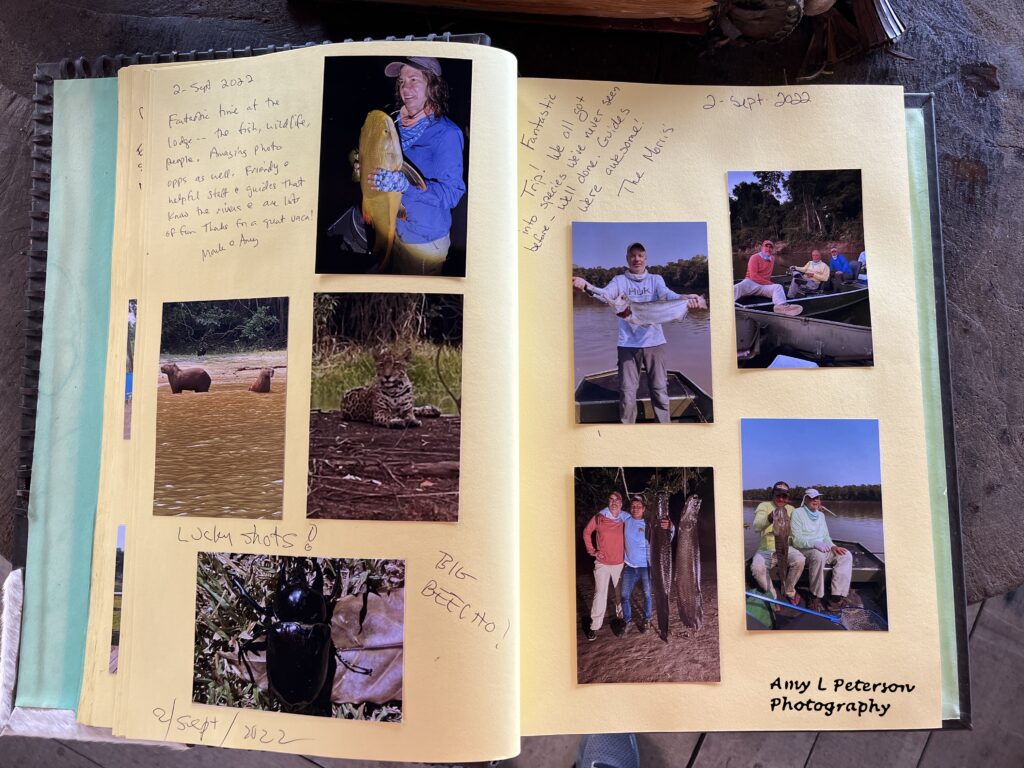
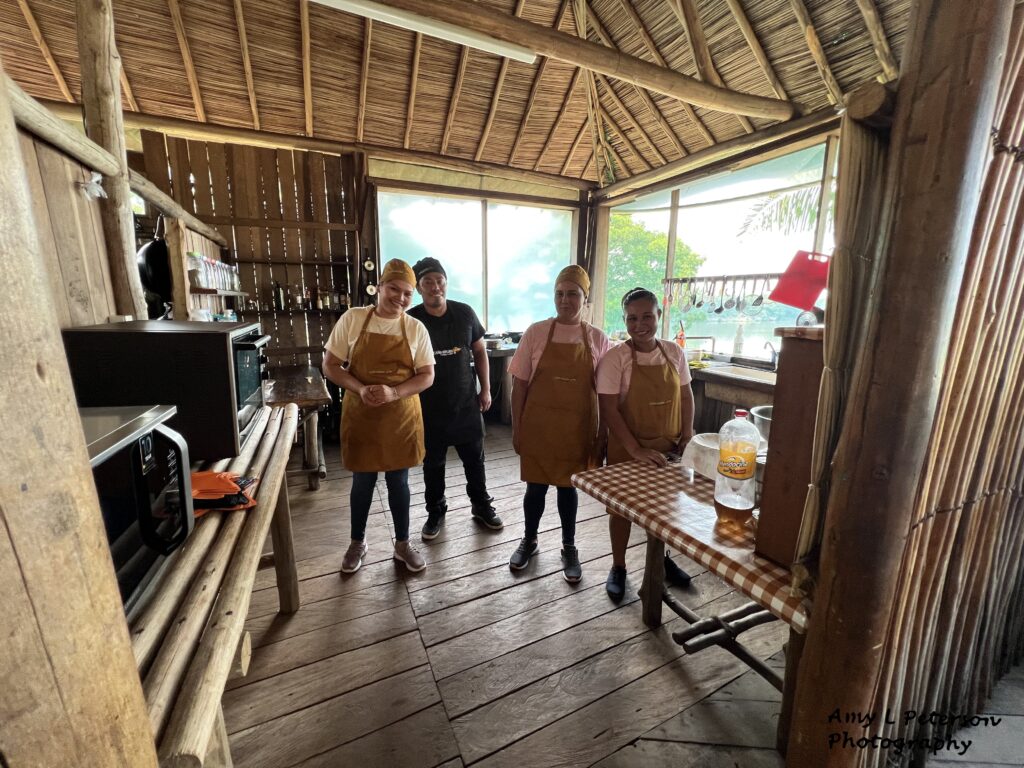
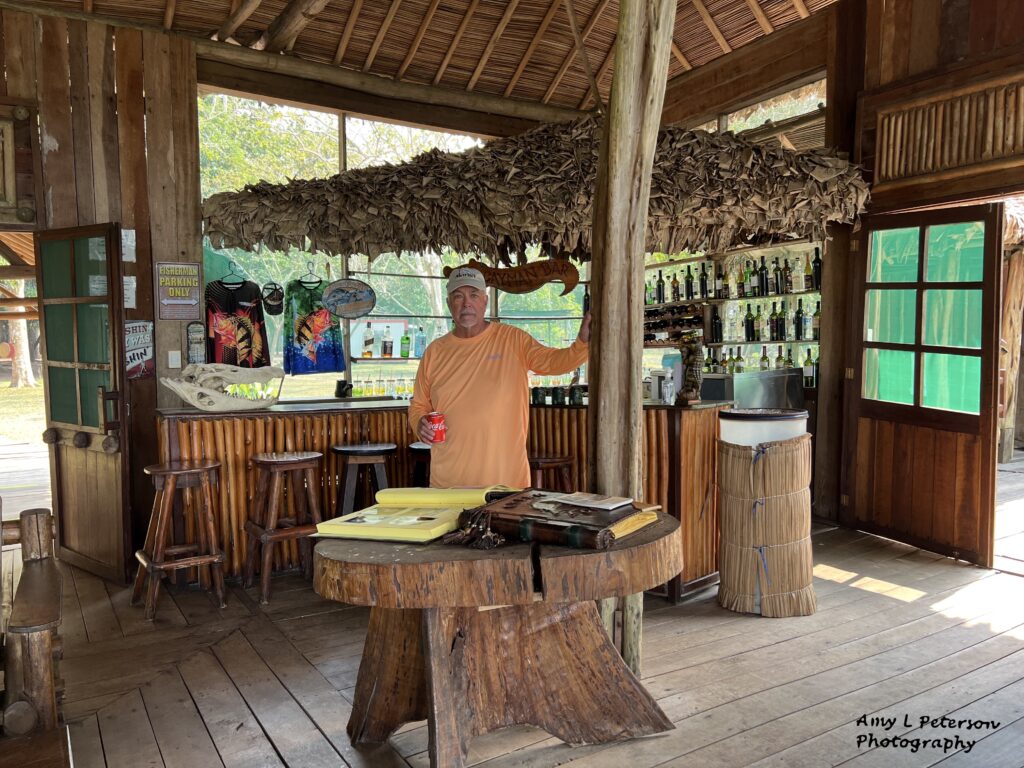
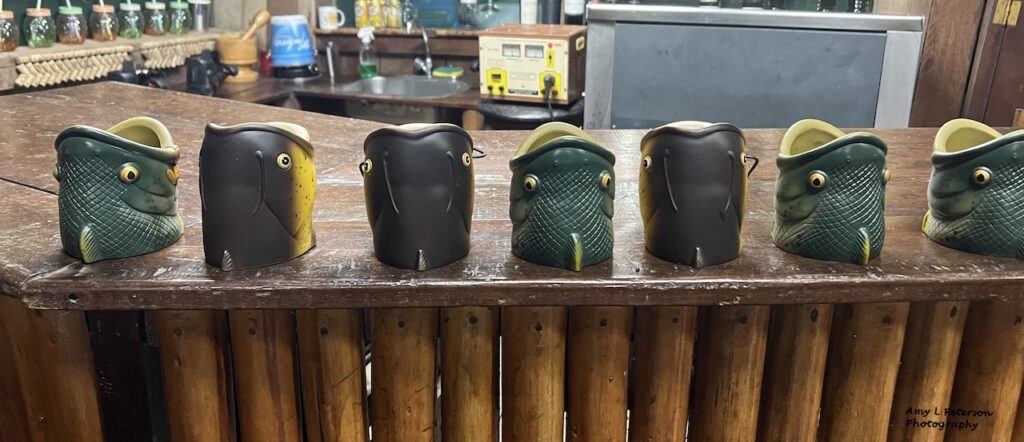
We dropped off an envelope with cash for the guides and a separate envelope for the cooks and other staff, including a lady we never saw who washed our clothes. Memo said that the staff share all their earnings and take it all back to their village when the fishing season is over.
We took in the last of the pleasant Bolivian air, chatted with Memo, and took a few more photos.
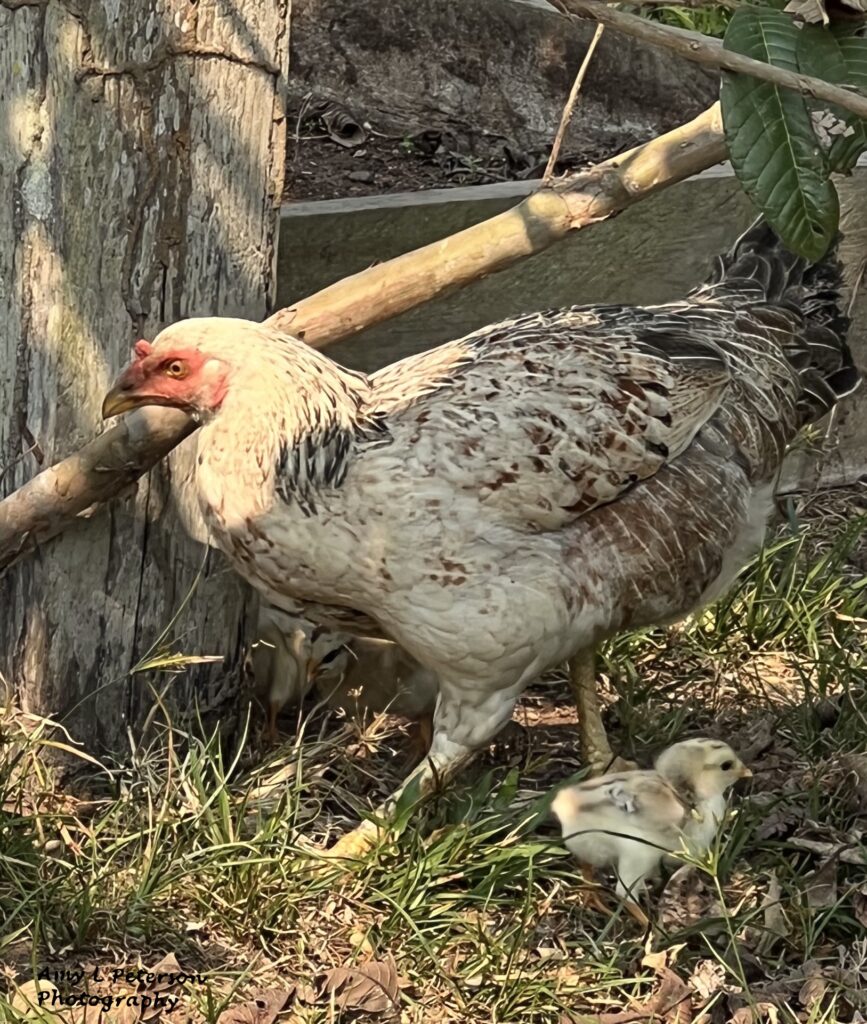
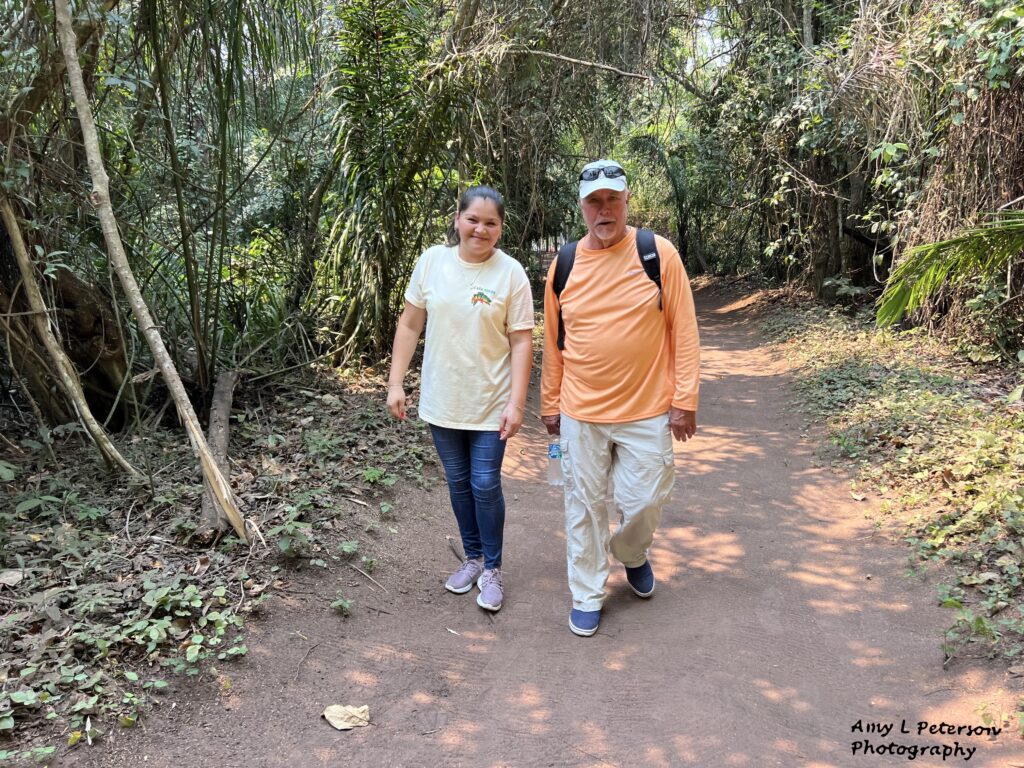
The plane for the Morrises came first, so I said good-bye to John Jr., Drew and John Sr., one hug after another. A half hour later, Mark and I got word our plane had arrived. Mark was escorted back down the well-groomed trail by Jennifer, who had walked in with him when we’d first arrived.
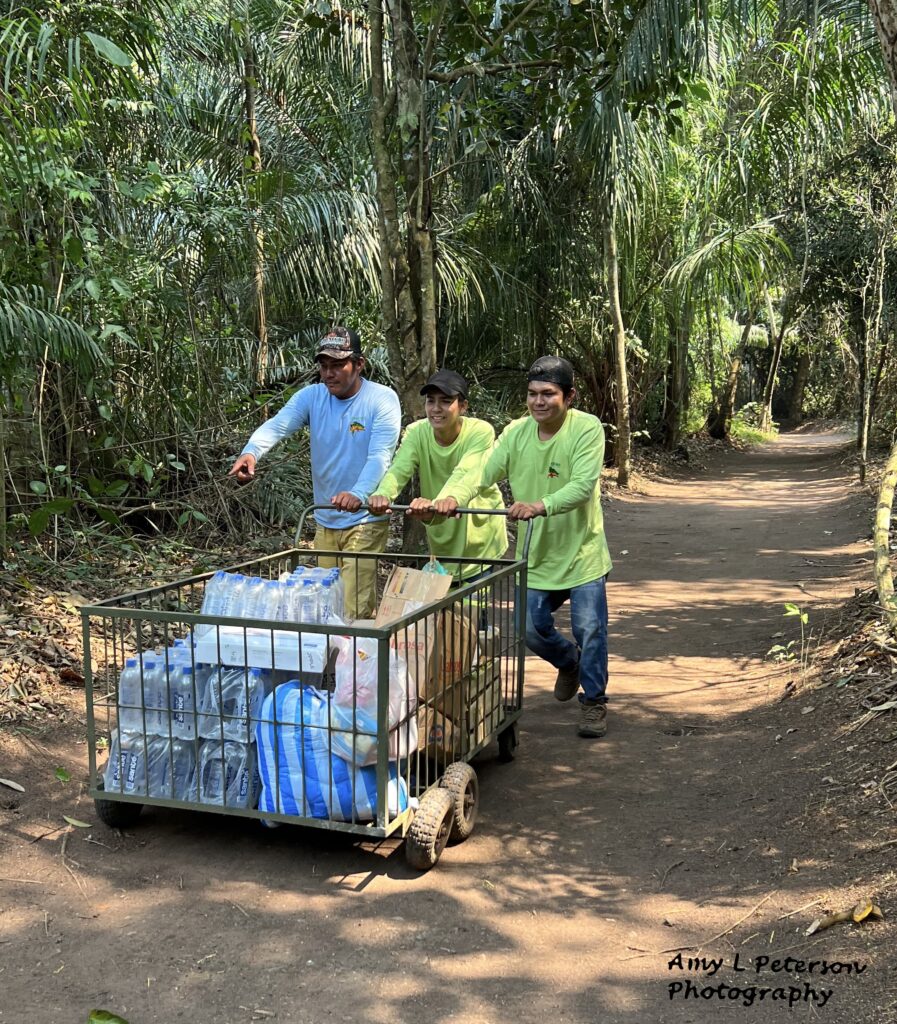
Our plane brought the next group of anglers and a bunch of supplies, the latter of which the guides pushed down the trail, thus repeating the cycle again.
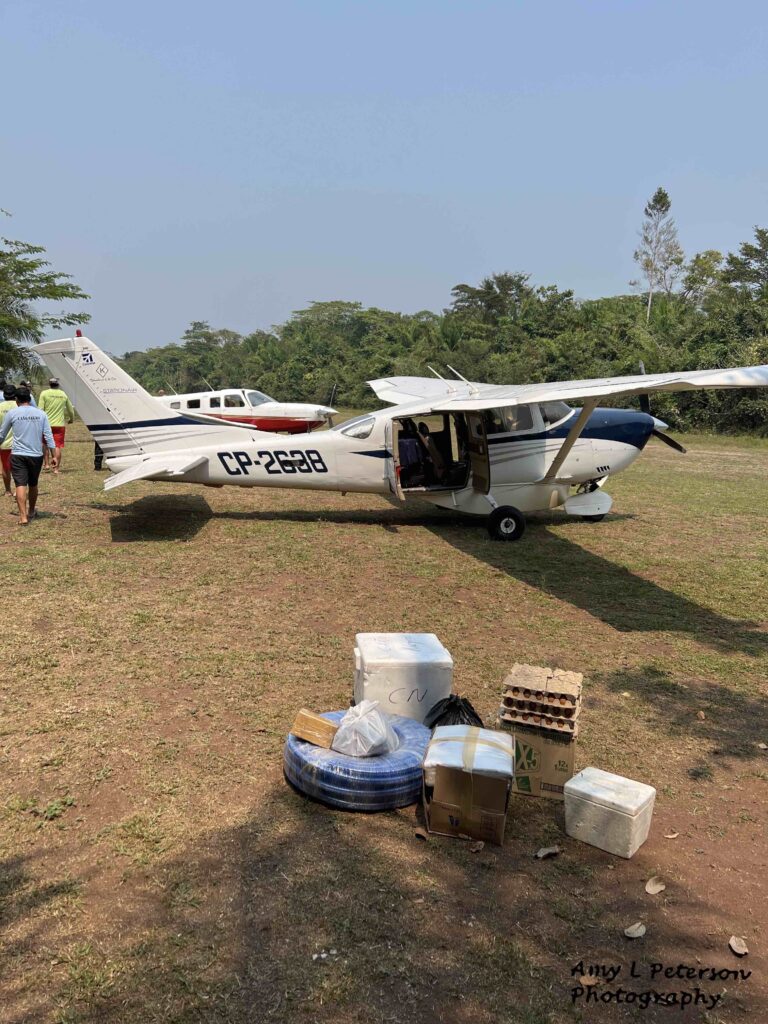
We waited for the black and white airplane to take off with a family of three who had joined us mid-week. Meanwhile, our pilot took a leak in the runway near the plane, got a Sprite and strapped down our luggage.
With the other plane safely in the air, we set off down the bumpy landing strip, which, when one is not landing, is also the take-off strip. But nobody seems to call it that.
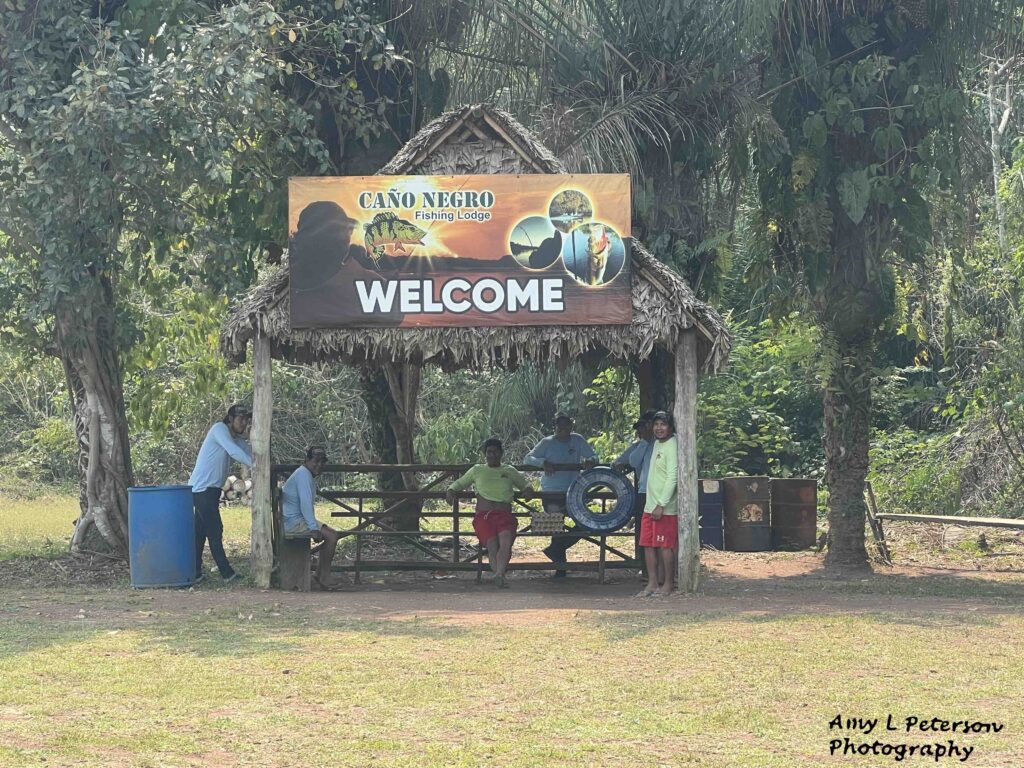
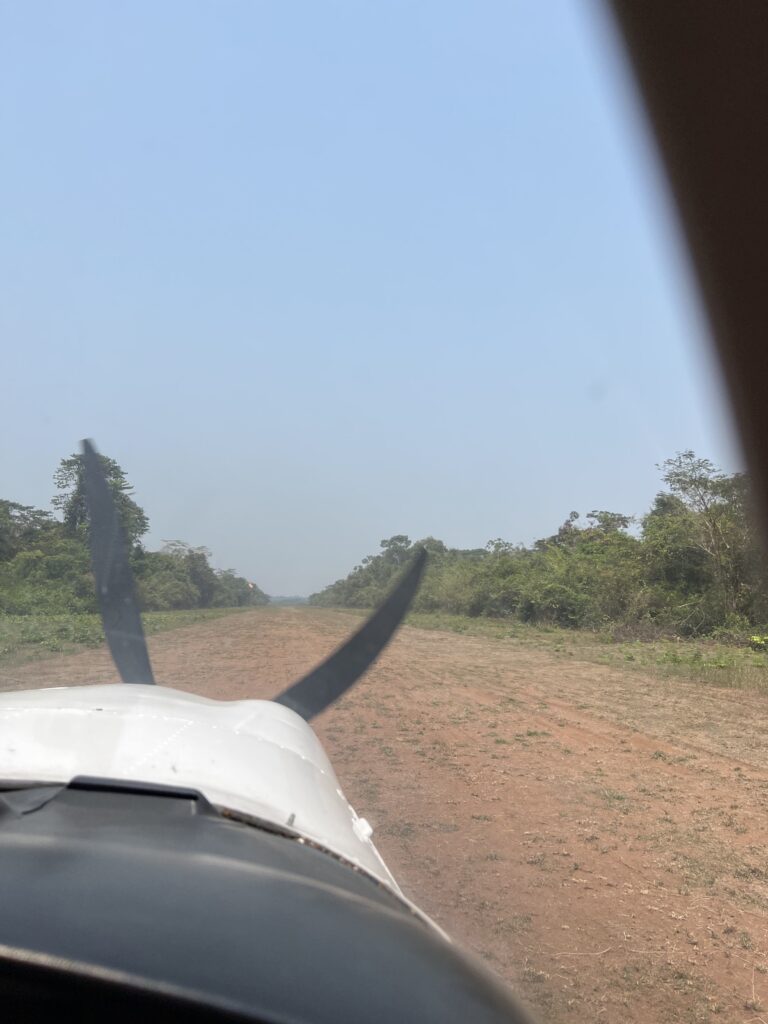
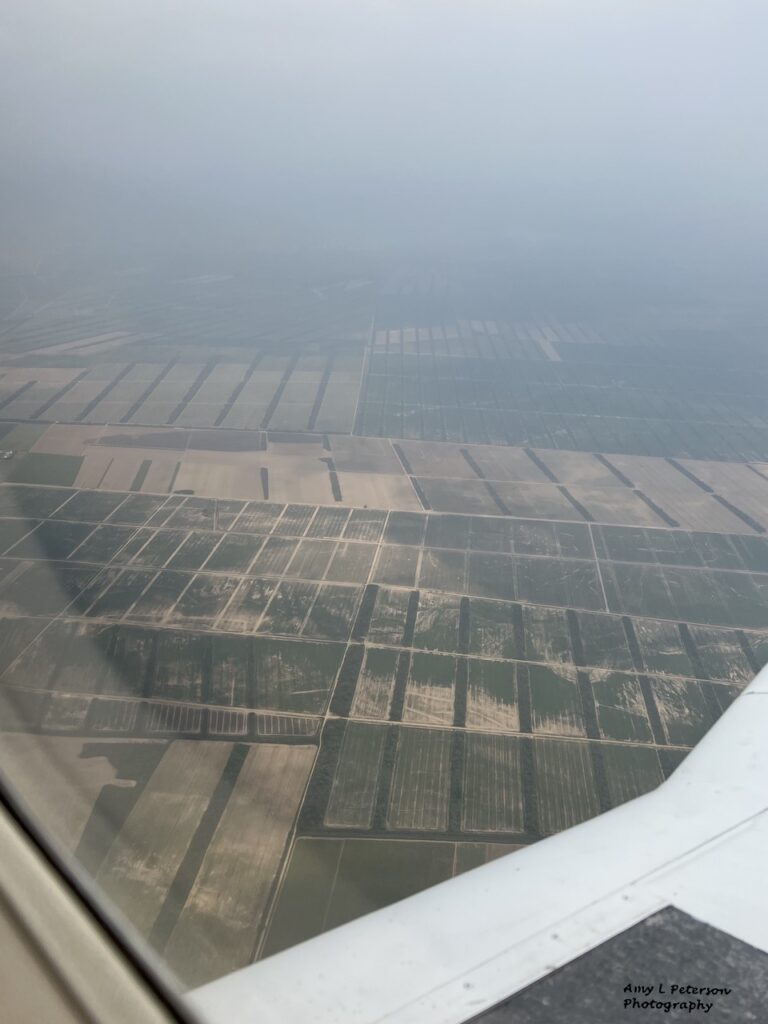
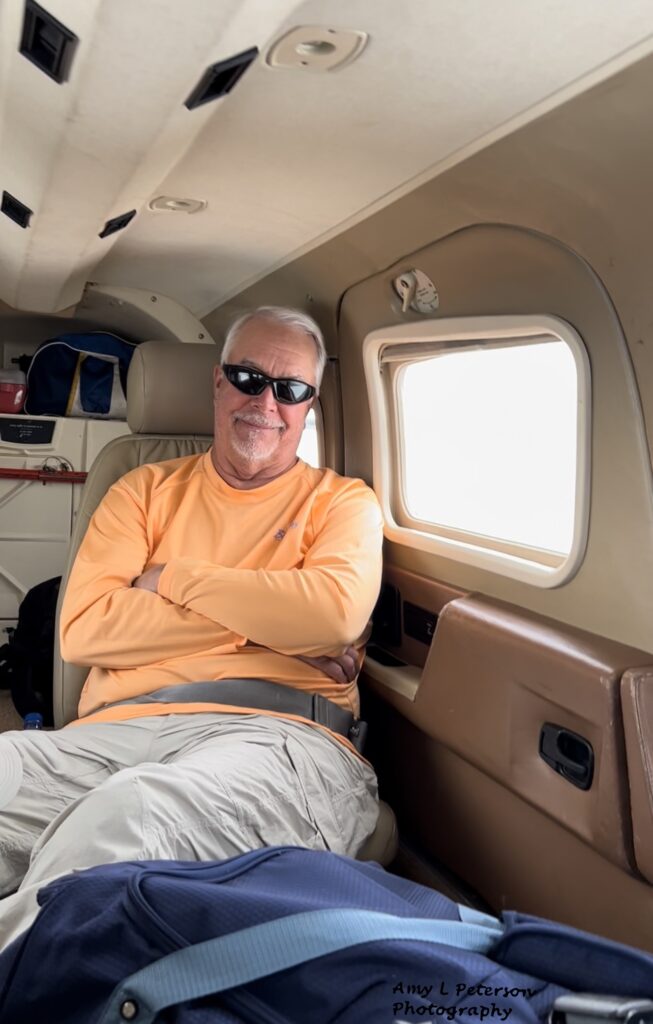
Mark was in charge of luggage again, while I assumed the role of co-pilot, which I was no more qualified for than I was seven days earlier.
The first hour of the trip went smoothly and I enjoyed taking photos out the window of an amazing landscape that was once wild and now farmed, once natural and wiggly and now a series of perfectly shaped rectangles.
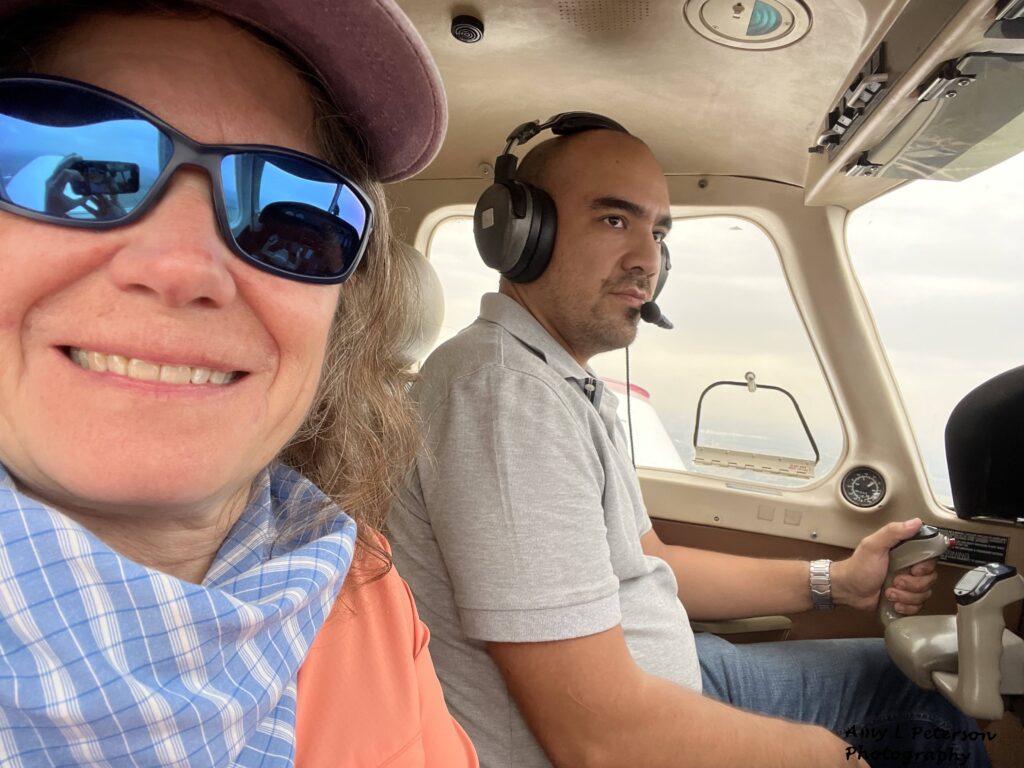
About an hour into our two-hour flight, the plane started doing something I didn’t think a small plane could do, which is wobble left and right and up and down at the same time. We had run smack dab into a strong head wind. This video shows Mark bobbing around like a bobblehead doll.
It was while wobbling in all directions that I noticed our pilot had already chewed his nails down to nubbins, but still found something to chew on. He also spoke quietly on the microphone on his headset, as if controlling his desire to scream. Most worrisome of all, he sent several text messages on his phone. I imagined one went something like: “El vela del avion da miedo. Adios, Amigo.” Meaning: “The airplane flight is scary. Goodbye, my friend.”
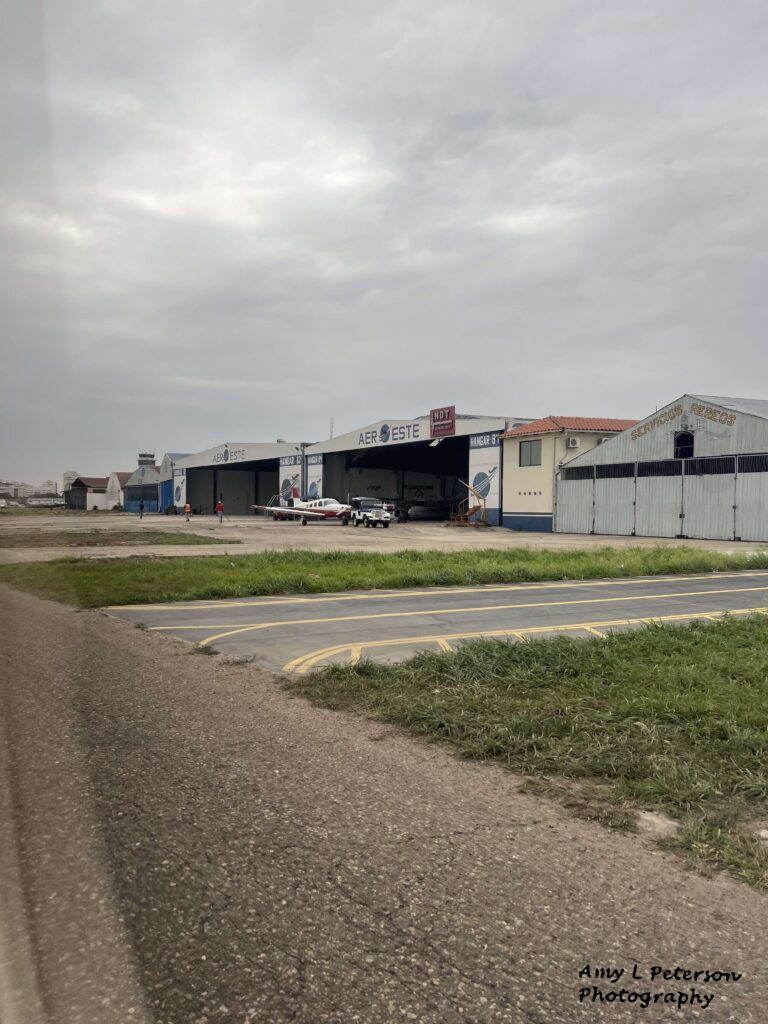
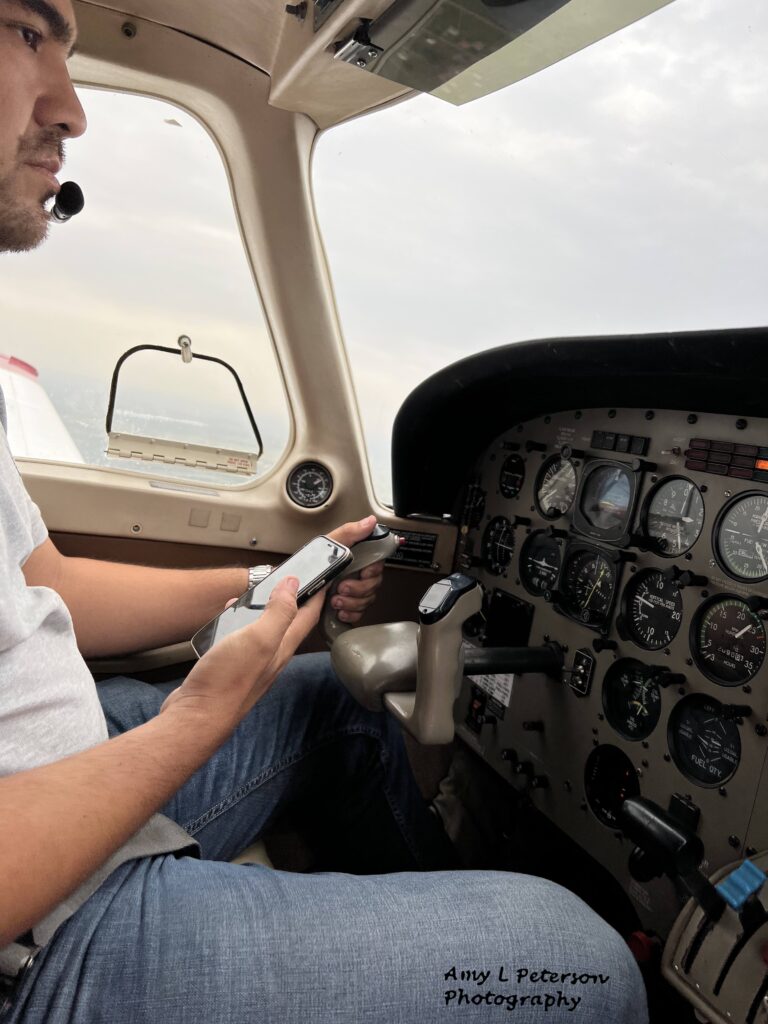
As I watched the plane go up and down and side to side, I took a video of Mark in the back rocking about and enjoying himself. That helped calm me a little. But as we approached the landing, the pilot’s feet and hands went into action, pulling and pushing this and that and adjusting this and that, and the yoke in front of me went in and out and to the right and left. Moments later, we touched the ground super smoothly. I went “Yay!” The pilot nodded like a stroke victim.
He taxied the plane to a small hangar Mark and I hadn’t seen before, and when the plane came to a stop, the pilot told us the flight was bumpy because the winds were 33 miles per hour. He spoke like a man who had just found out his wife was pregnant with triplets and in need of a stiff drink. I thanked him for landing us safely. Mark said something about a job well done.
The wind had brought with it temperatures about 15 degrees cooler than what we had enjoyed all week. While I noticed the change, I was more focused on finding a bathroom, because I was having a bit of a stomach upset, perhaps because I had squeezed my sphincter for so over an hour and it was keen on relaxing. I found a tiny bathroom, and when I returned to the hangar lobby, Mark was talking with the pilot, who was using his phone to call Benjo.
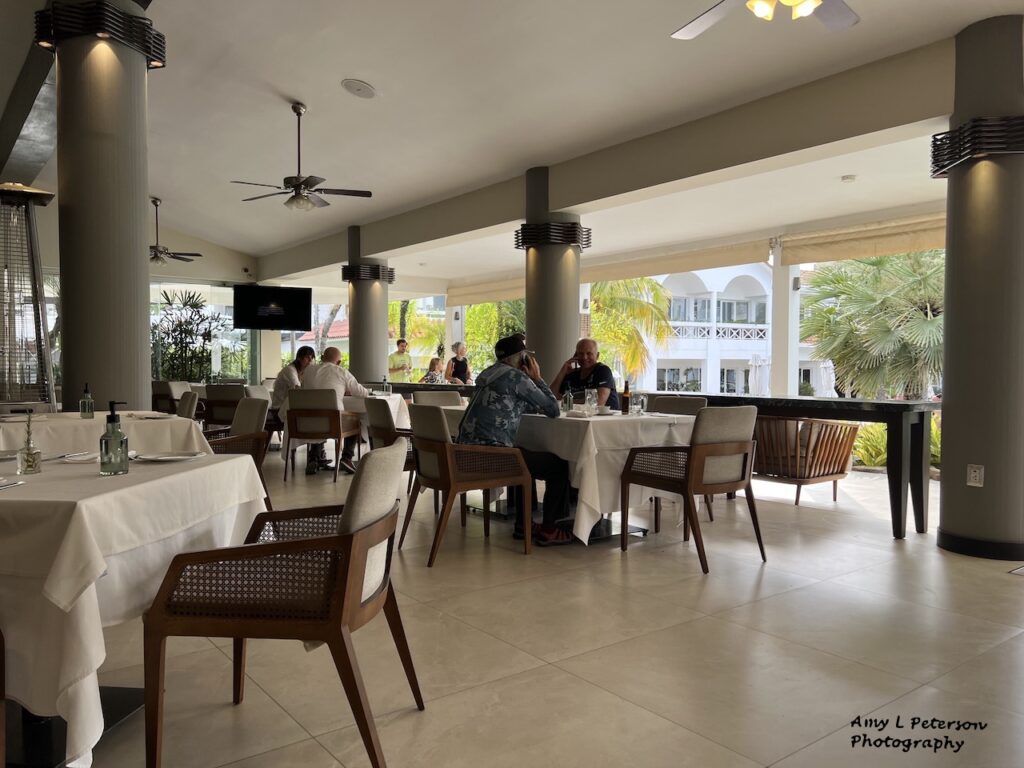
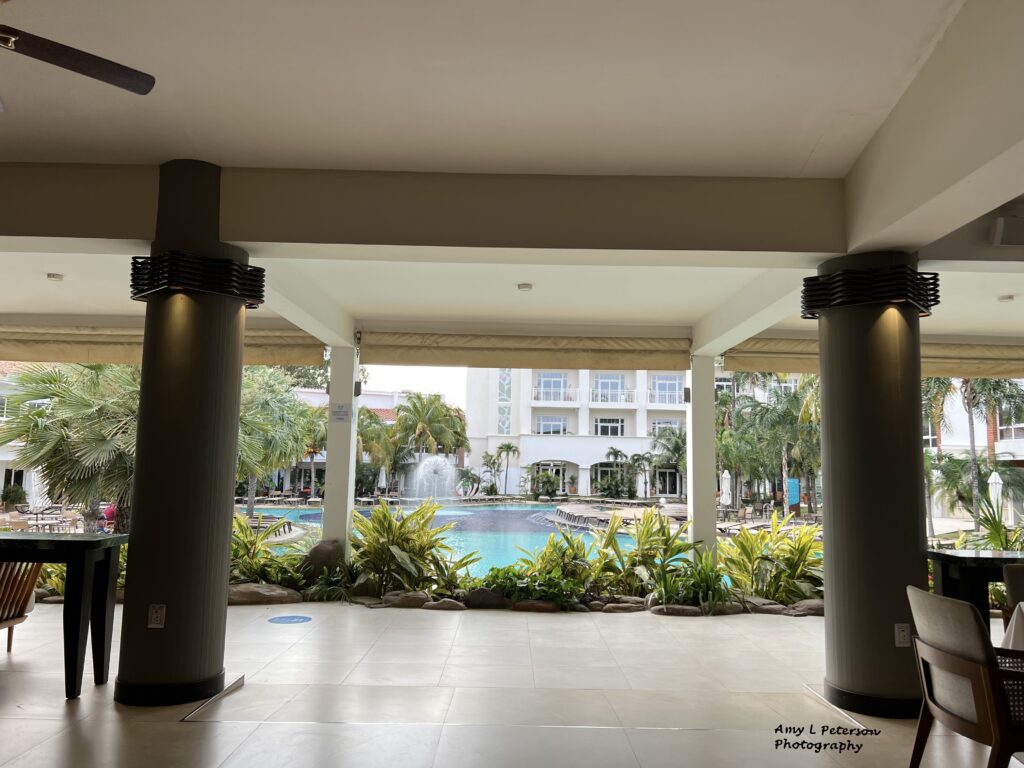
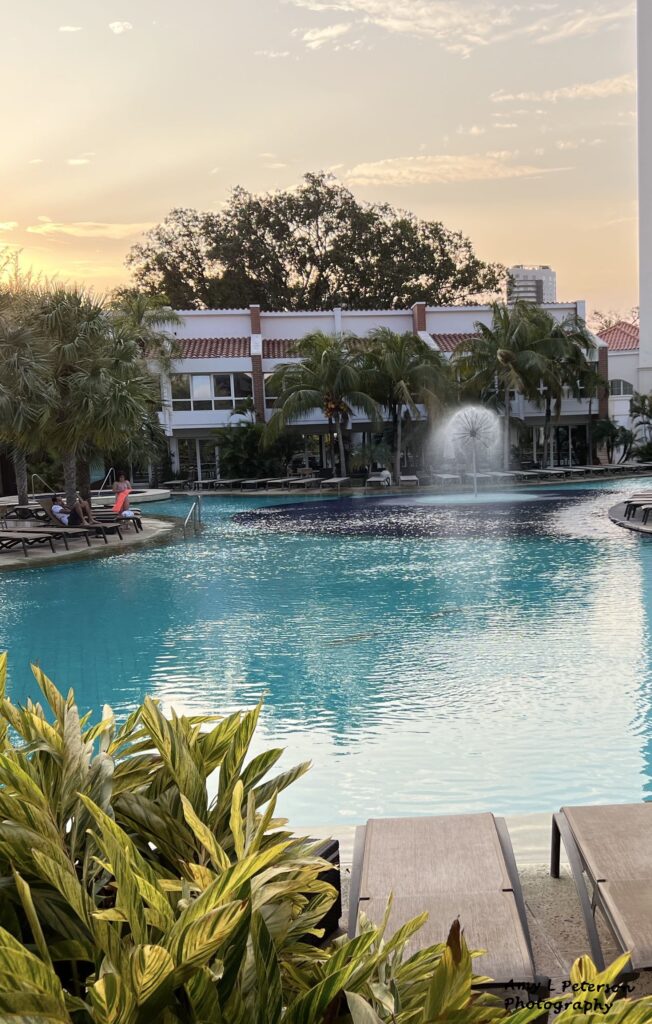
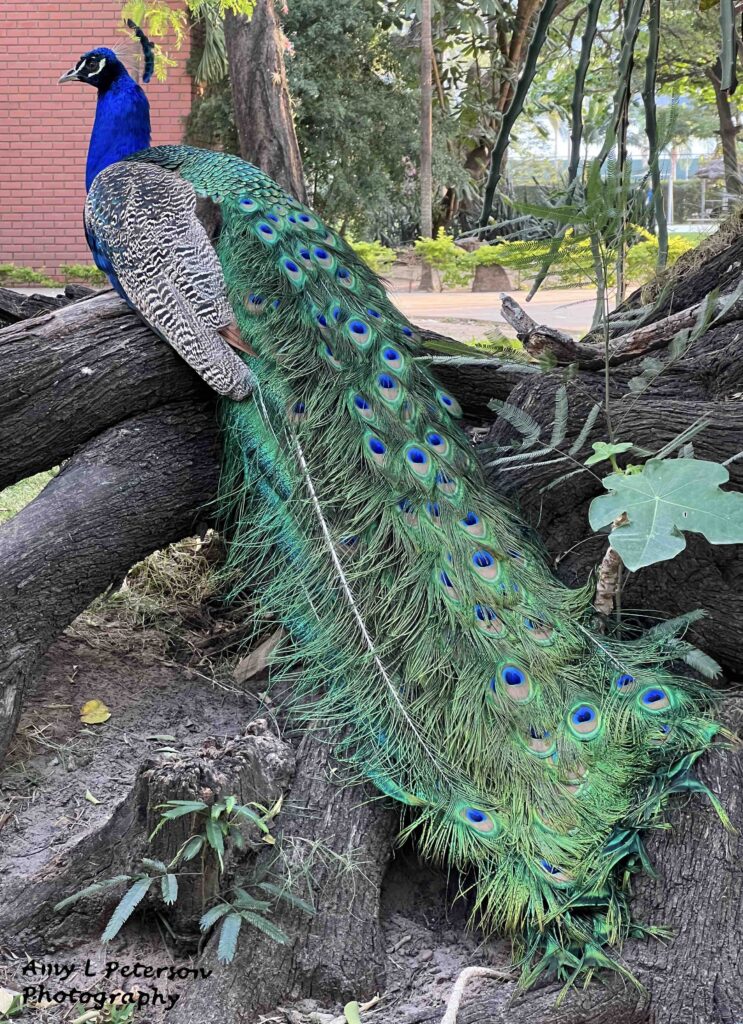
After a tasty lunch, I walked the grounds and took photos of peacocks and some of the local vegetation.
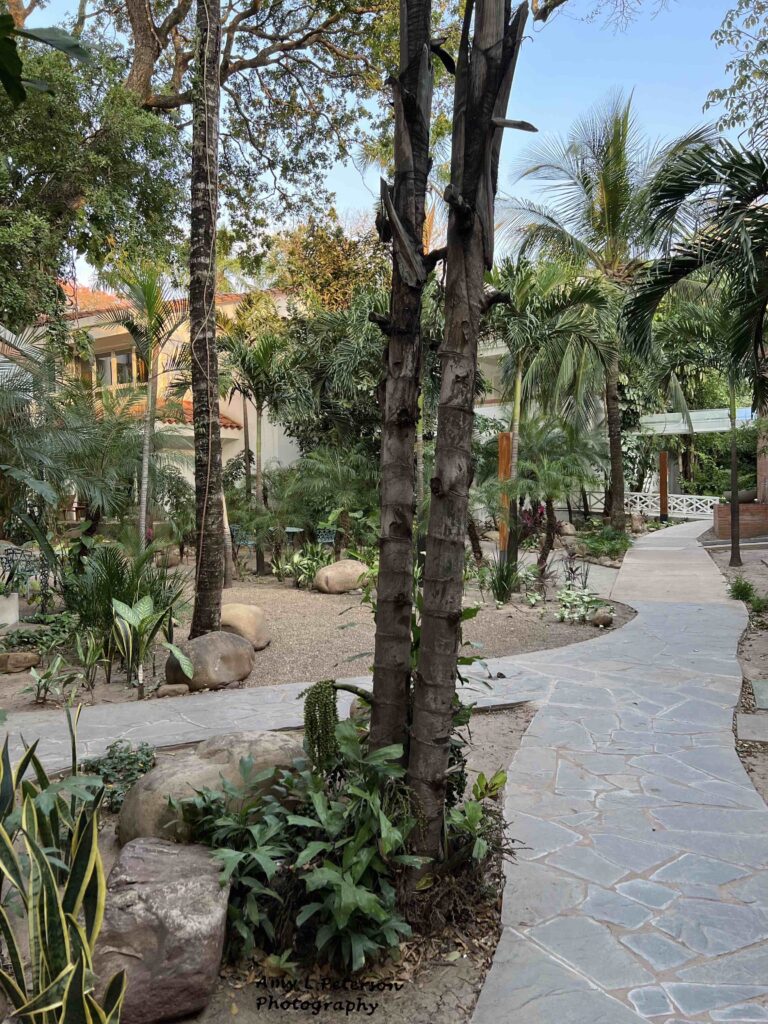
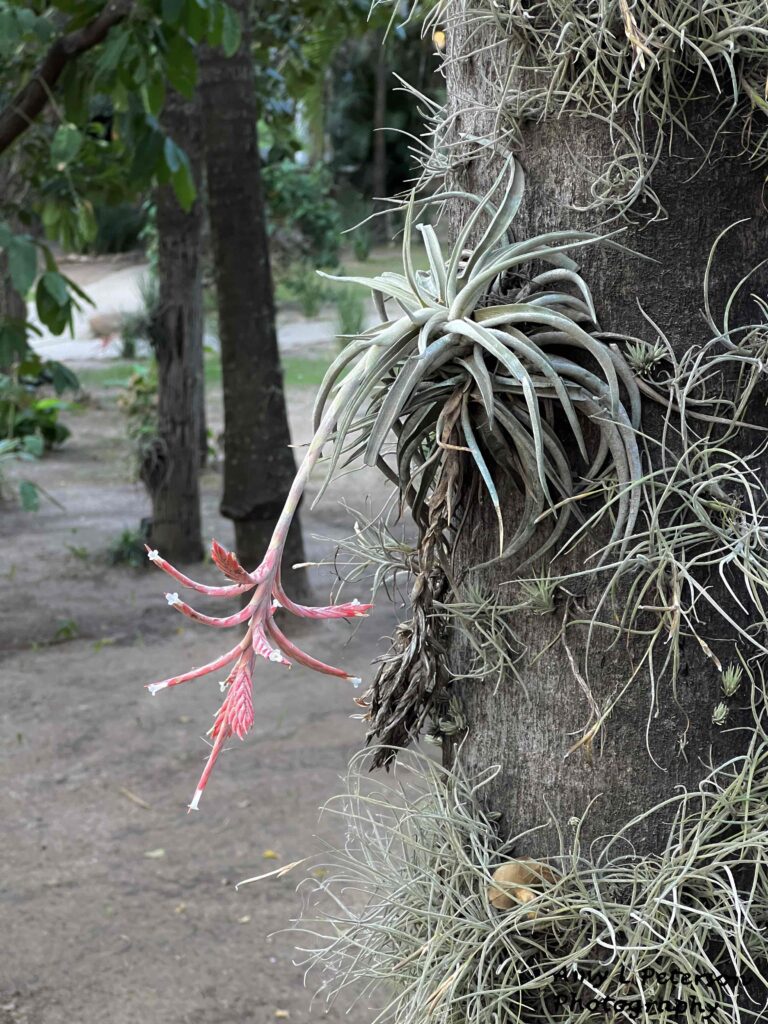
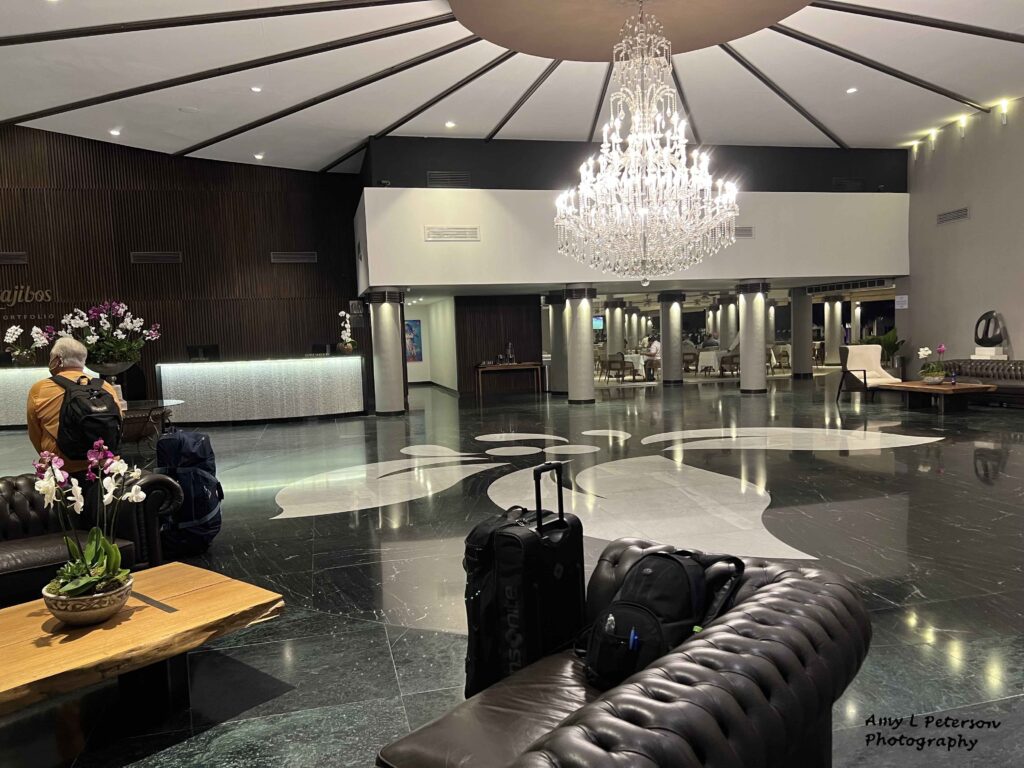
At 7:30 p.m. we waited in the lobby for Benjo to pick us up to take us to the airport. He loaded up our bags into his pick-up truck like he had before.
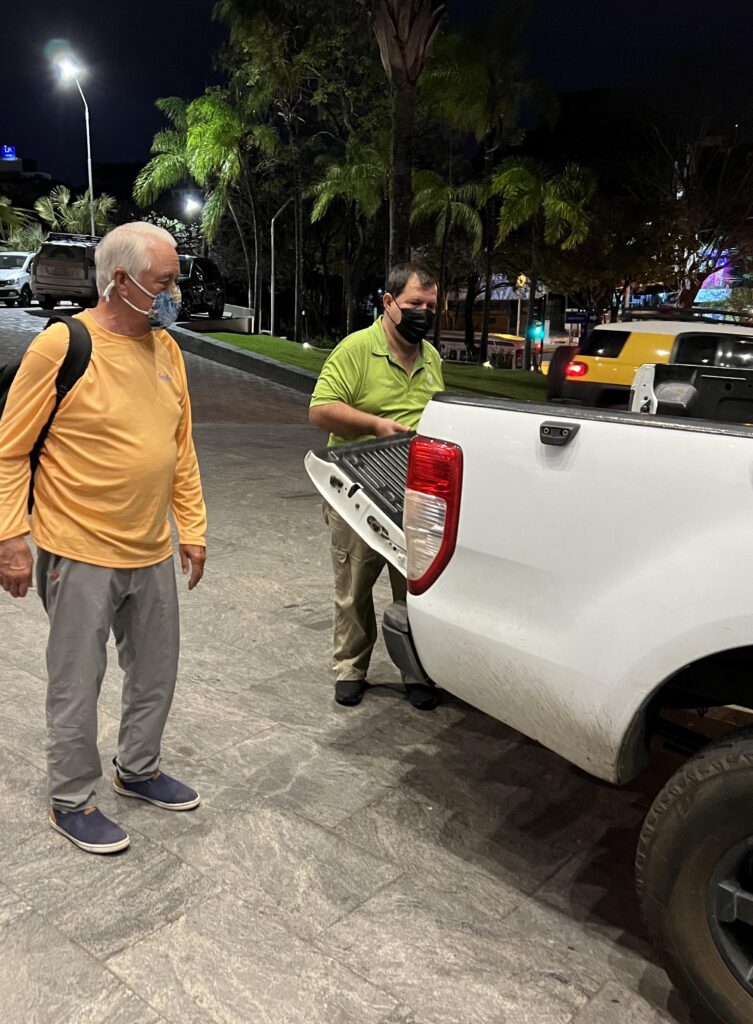
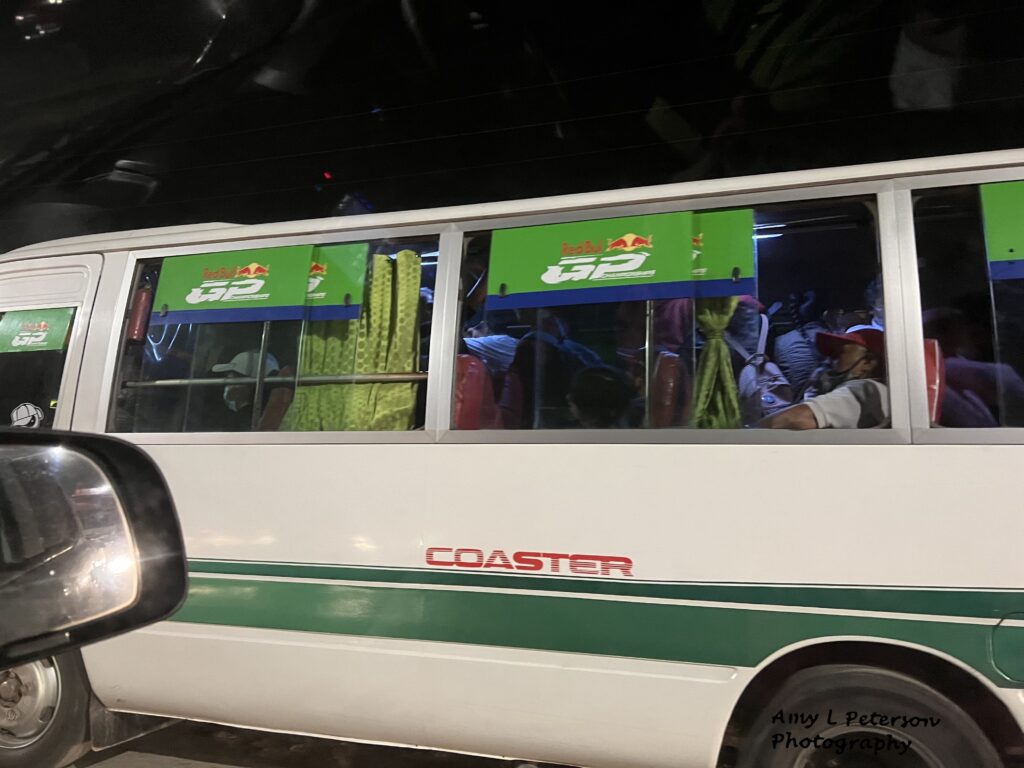
It was Friday night and the streets were busy with people moving around by car, truck and bus. The buses were smaller than buses in urban Michigan, and the people onboard were standing next to people sitting.
The other thing we saw that we don’t see in the US are ladies wearing short shorts and low, tight tops, waving people into liquor stores. There were several liquor stores off the main streets and every single one was marketing the same way. Mark found that a very nifty idea indeed.
We got to the airport parking lot, and once inside, noticed there weren’t many people around. We stepped up to the counter and were told that our flight had been cancelled. We were re-booked on a 9 a.m. flight the next morning. Thankfully, Benjo stayed with us, loaded our luggage back into this truck, called Los Trajibos and got the room we had already paid for. And so we enjoyed another evening and night at the motel. We set the alarm for 6 a.m.
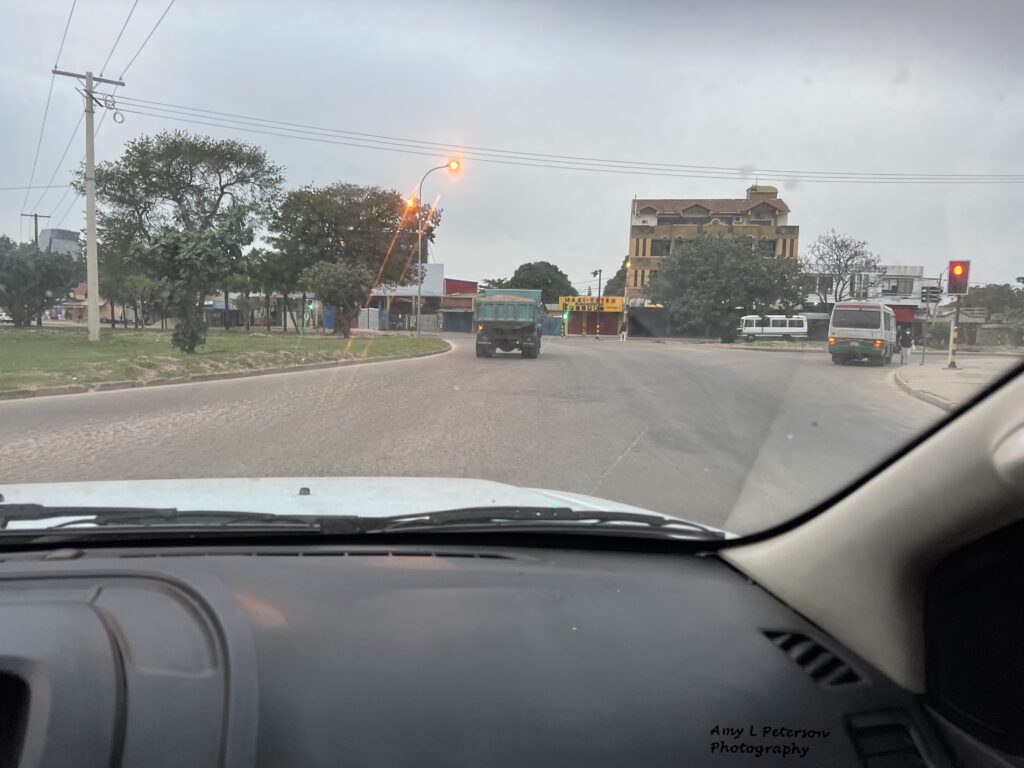
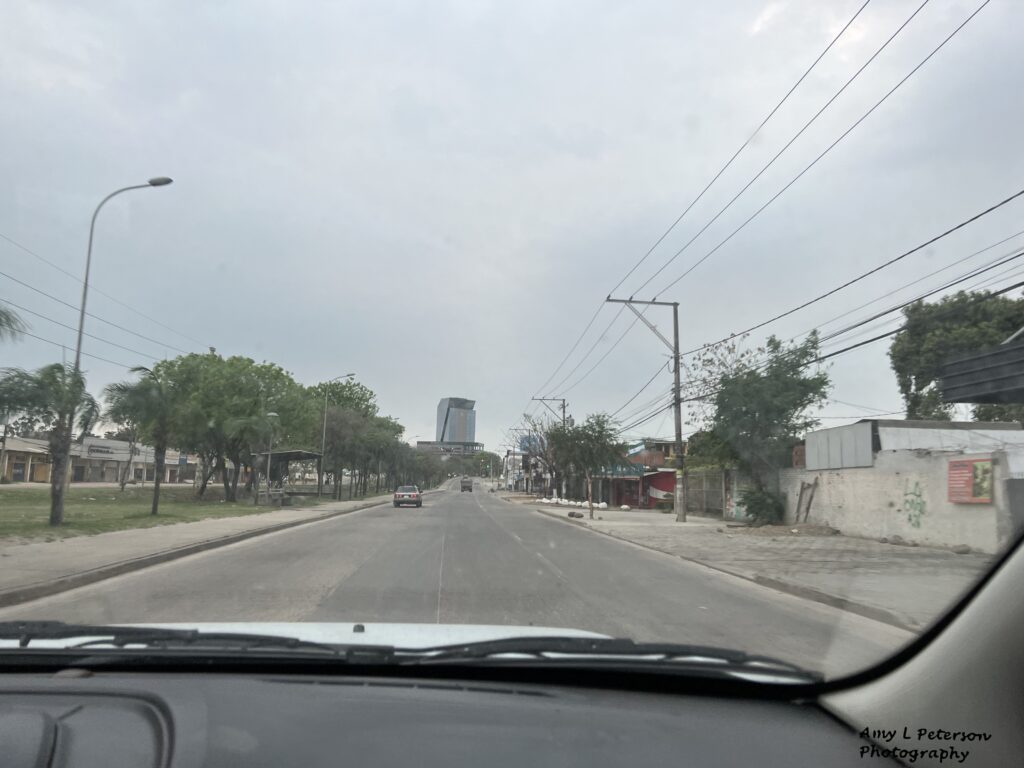
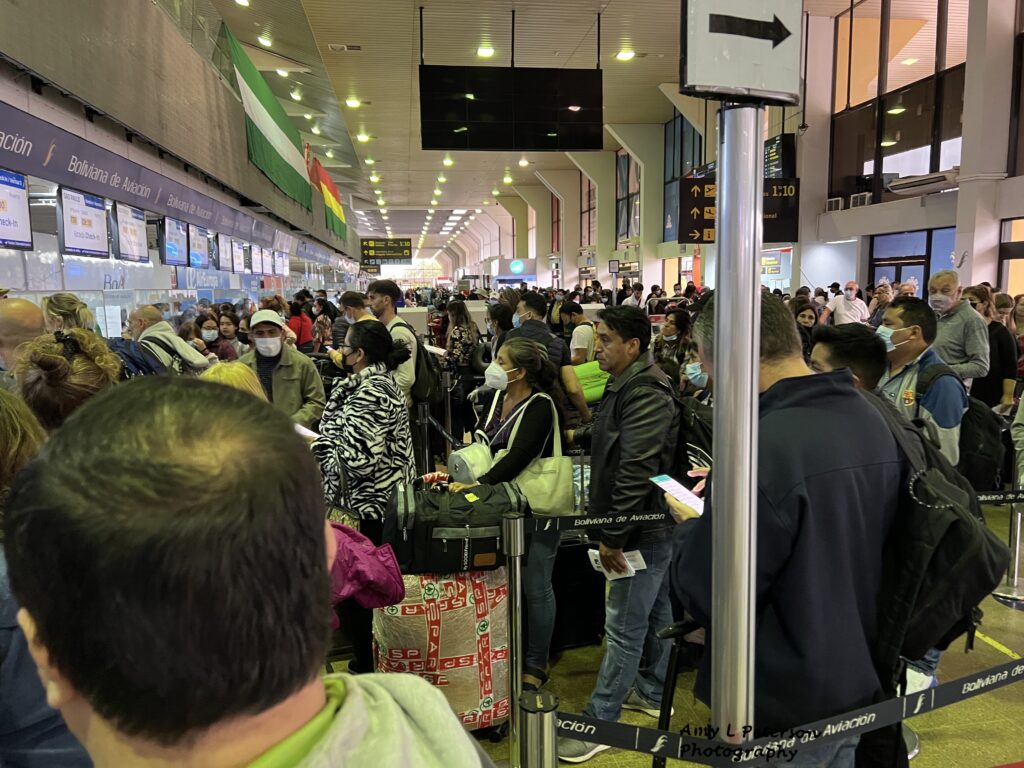
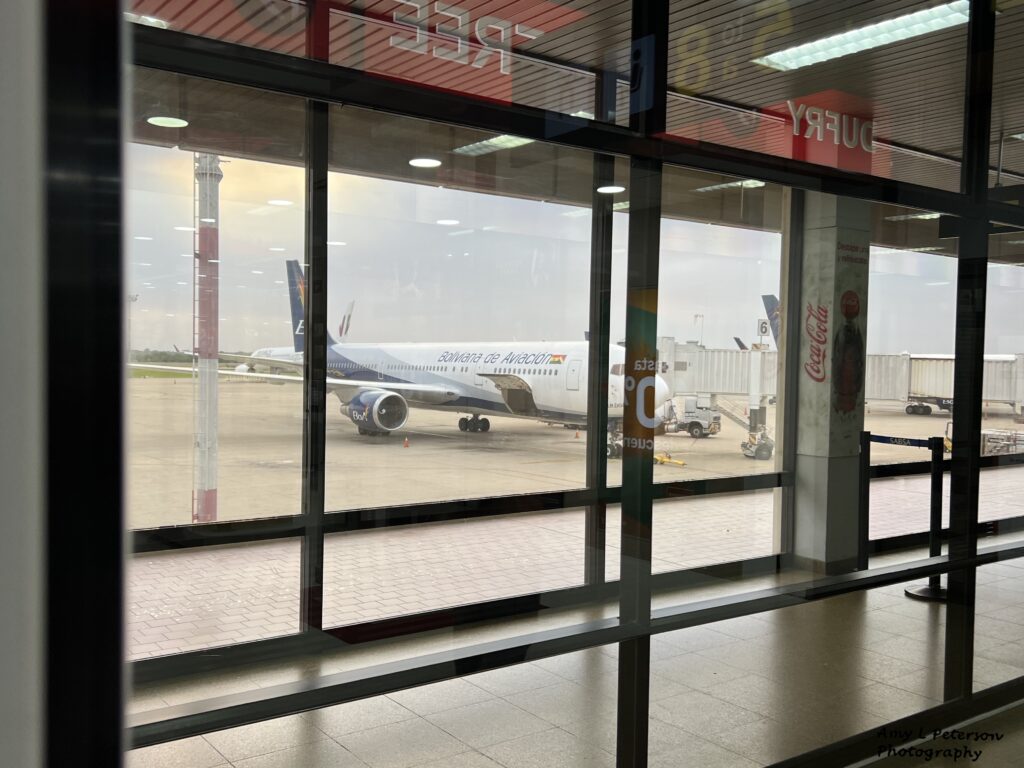
We said good-bye to Benjo, gave him a tip for all his patience and help, and got our carry-on bags scanned. Then we went to another line and had our boarding passes and passports checked, followed by another line that combined people coming into the airport from a flight that had just arrived…and our carry-on bags were scanned again. We got into another line where our boarding passes and passports were checked again, we were told to wait. After several long minutes, we finally had our photos taken, our visas updated, and our passports stamped. We headed to the gates, which was at a small area crowded with people who were mostly standing because there weren’t many seats. Forty-five minutes later our gate changed, so we joined people huddled together at another spot 100 feet away. Behind the huddle was an L-shaped line that had formed, which over time, more and more people ignored, preferring huddling over getting into a line.
This was the scene at 9 a.m. when the plane was supposed to leave. To pass the time, we chatted with several people, including a young lady who got to the airport late last night alone and had to find a motel room. She said her trip into the country was similar to ours–that she didn’t have a paper copy of a reservation, but in her case, it was because she was staying at a training center. She’d had to call a teacher to talk to one of the Brutes at the airport just to get into the country.
We talked with a guy who asked us where we were from and if we’d come back to Bolivia. When we said, “Probably not,” he said it was common knowledge that getting in and out of the country was difficult, but nobody did anything about it. We agreed being short-staffed was one thing, but being over-staffed on entry was odd, and how about taking a couple of Brutes at customs and reassigning them to this part of the airport to help people get organized and the planes taking off on time?
But alas, there was no Suggestion Box and nobody asking for input. I was just an impatient American experiencing a staffing problem at a small, third world airport.
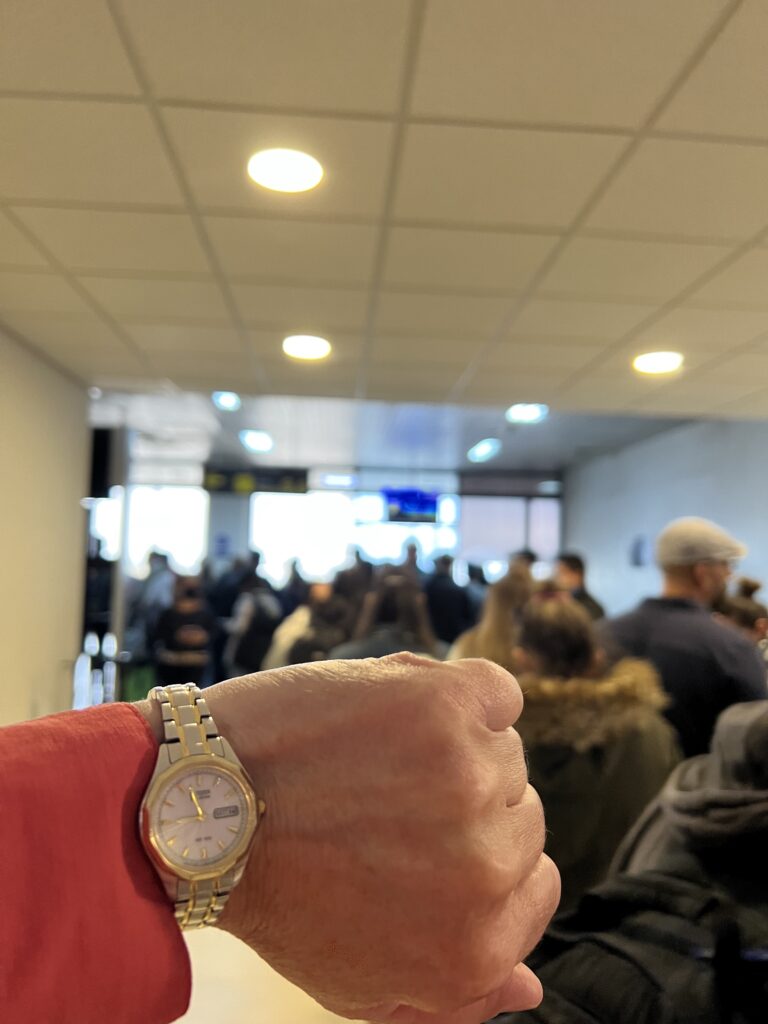
At 9:30 a young attendant asked us to get into two lines based on the classes of our tickets. At perhaps 9:45 we started boarding. At 10:30 a.m. we were ready to take off. It was a 7-hour flight and our flight out of Miami was at 6:45. I was somewhat hopeful that we’d make it.
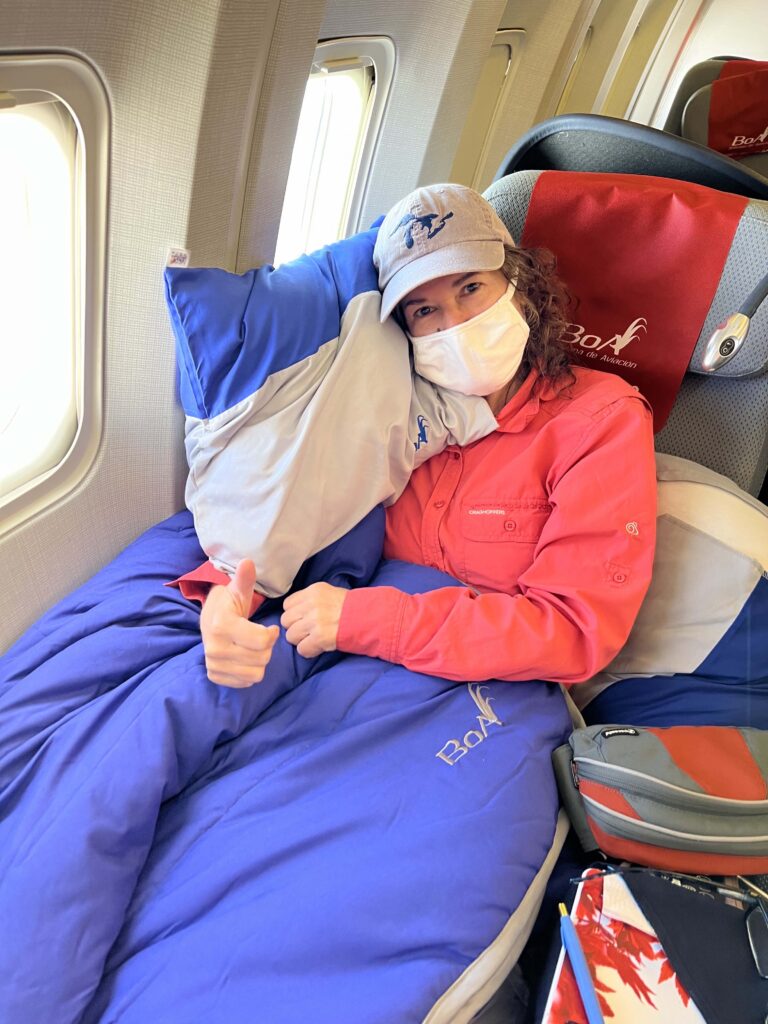
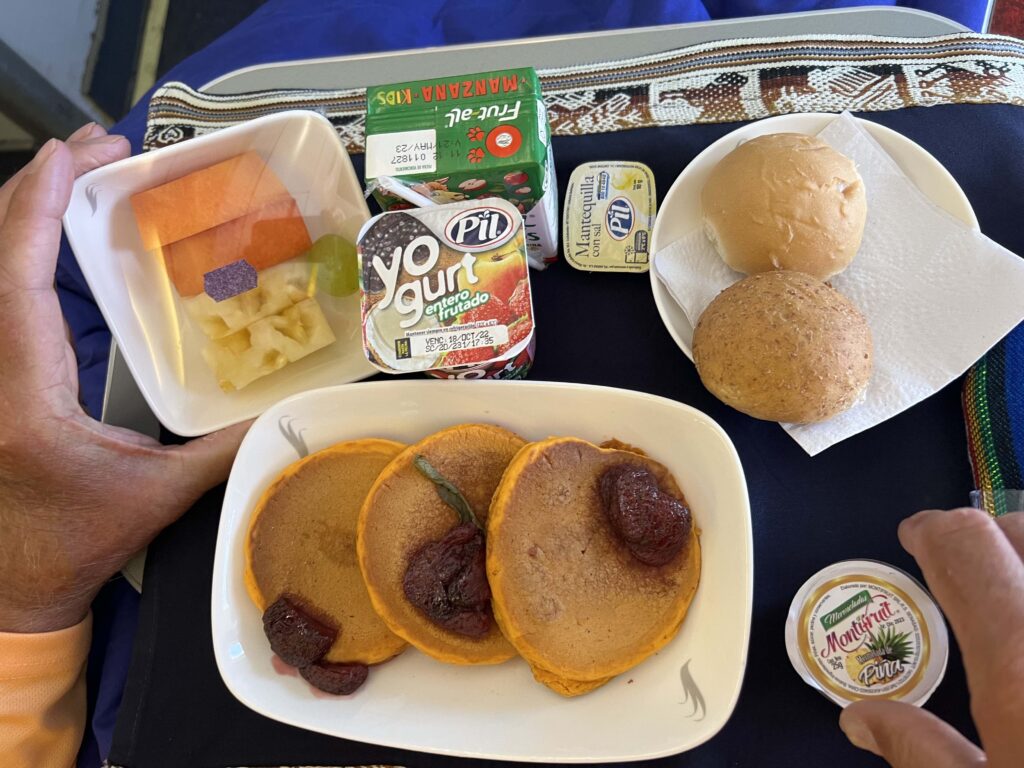
This trip was the first time we’d ever flown first class, and as I settled in with a cold bottle of water, a pillow and blanket, I fell in love again with the Bolivian Airlines. Soon after we took off, some amazing food appeared. This was Mark’s breakfast. I had an omelette.
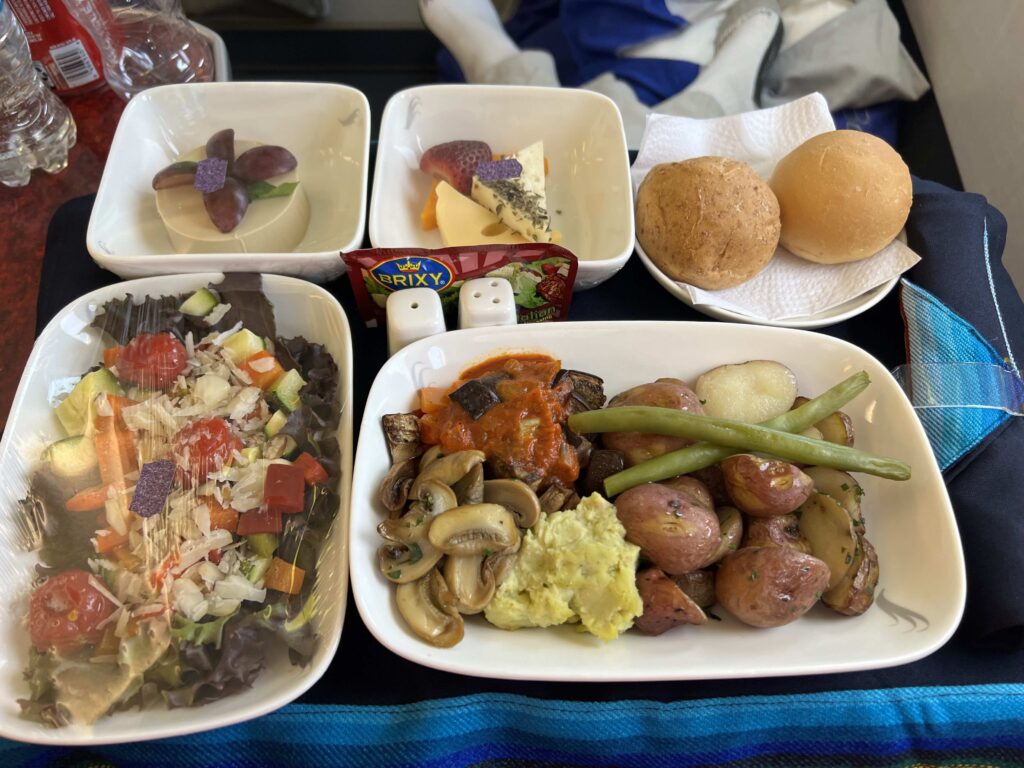
After eating breakfast, we took a nice, long nap. When we woke up five hours later, this lunch appeared. I wondered how people who fly first class regularly aren’t all overweight.
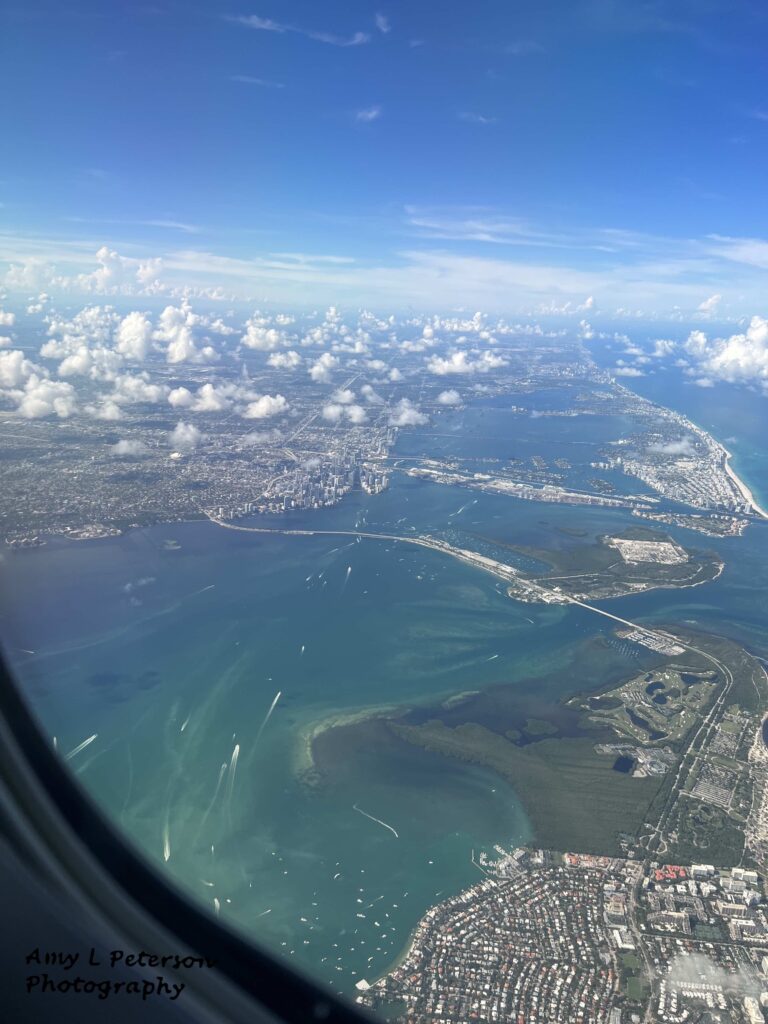
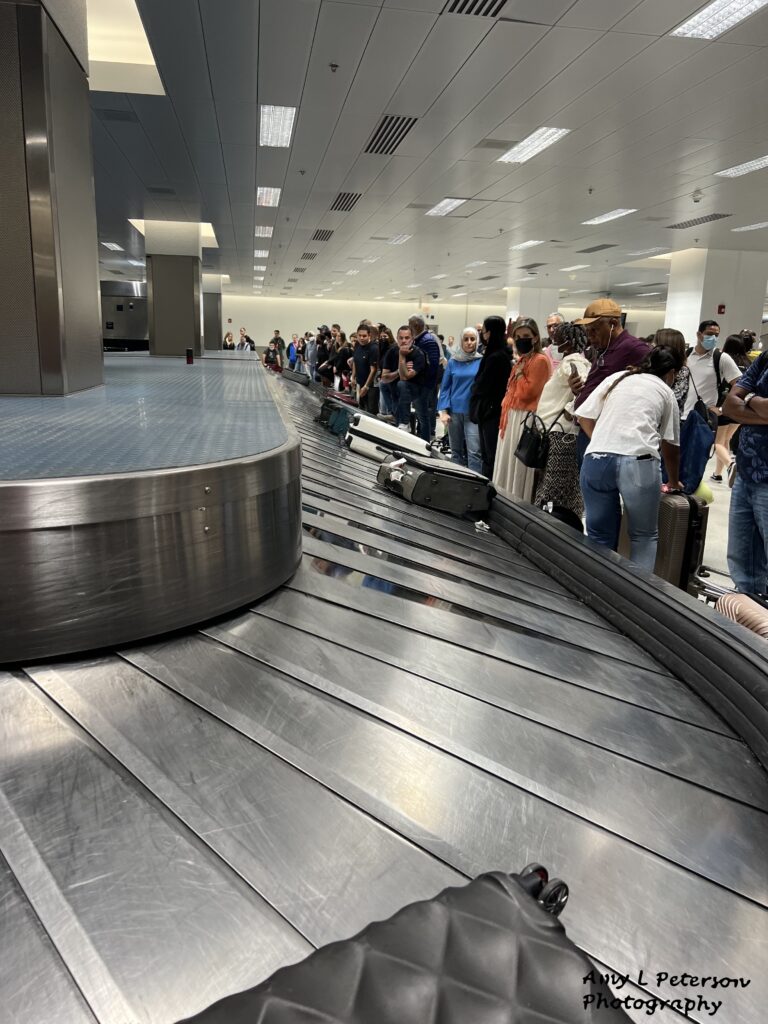
We landed at 5:30 p.m., plump and happy and still convinced that if we could get our baggage in 20 minutes, we’d be able to run across the airport like we’d seen on commercials, and catch our flight home.
But no. It took 20 minutes for the first set of bags to show up at baggage claim. Then the conveyor belt stopped. Twenty minutes later–during which time I imagined the worker(s) smoking more than a little pot–another batch of luggage appeared on the conveyor belt. We waited hopefully. But no. The conveyor belt stopped. Another 20 minutes and likely several joints later, the belt moved again and finally, our bags showed up. We grabbed our bags and sprinted across the airport to a check-in area, where–similar to the previous evening–there was nobody in line. It was 6:15. The clerk behind the counter said that they’d done the final boarding. She booked us on a flight the next day at noon…and told us to have a good evening.
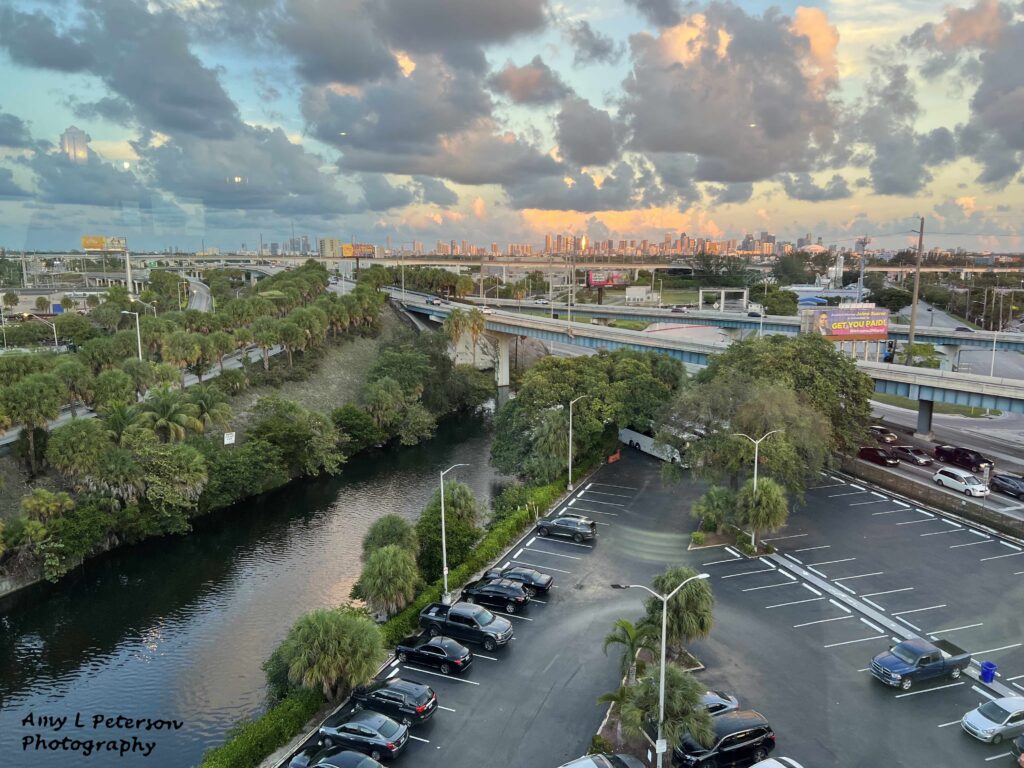
We went to bed at 9:00, and Mark started Sunday September 4, 2022 by taking a shower…and ended up standing in dirty bath water because the drain was plugged. We packed and marched down to talk to the 20-something-year-old Young Thing at the front desk. After lodging my complaint, the Young Thing asked me why I hadn’t called about the drain problem last night. When I explained that we didn’t shower last night, she said that she hoped we’d enjoyed the rest of our stay. Mark said the housekeeper should be fired; I asked for my money back; the Young Thing she said she’d talk to housekeeping, that they can probably do better. Mark and I guided each other onto the awaiting shuttle like two people trying to keep the other from engaging in a fist fight.
Once settled on the shuttle, Mark reminded me that between the motel, extra dinners out, two more days to keep the dogs at the dog spa, two more days parking at Detroit Metro, and paying the pet sitter, it was the Bolivian airlines that was really at fault here and why we were out $500 and still not home…where our tubs drain. I told him I’d be sure to mention that when I got home and called the Bolivia suggestion hotline.
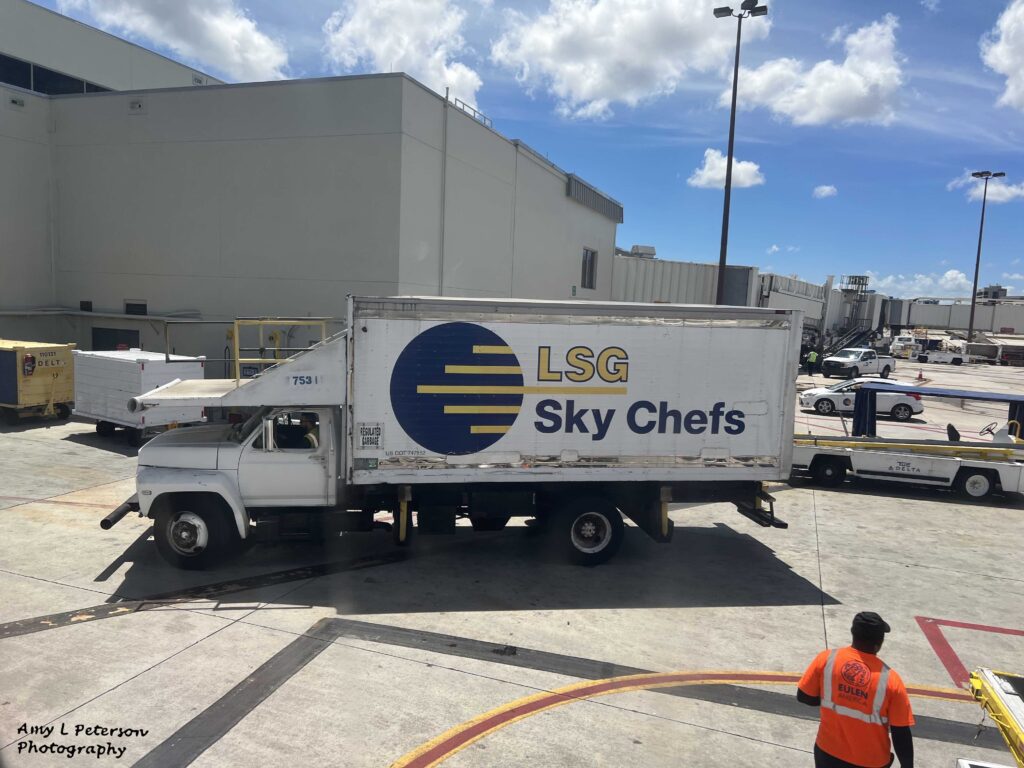
We hung out at the airport until around noon, when we got to board the airplane. While waiting on the plane, we witnessed the magic behind getting food onto the plane. I’d seen the Sky Chefs truck before, but this time, I got to watch the front of the truck lift up, a guy appear from a sliding door above the cabin of the truck, and a cart of food slide off the truck and onto the plane. The guy disappeared behind the door and the truck pulled away. Meanwhile, luggage was being loaded below: two guys loading, one guy scanning everything, one guy, supervising. I compared that to what I imagined was one guy at the airport in Bolivia…smoking weed.
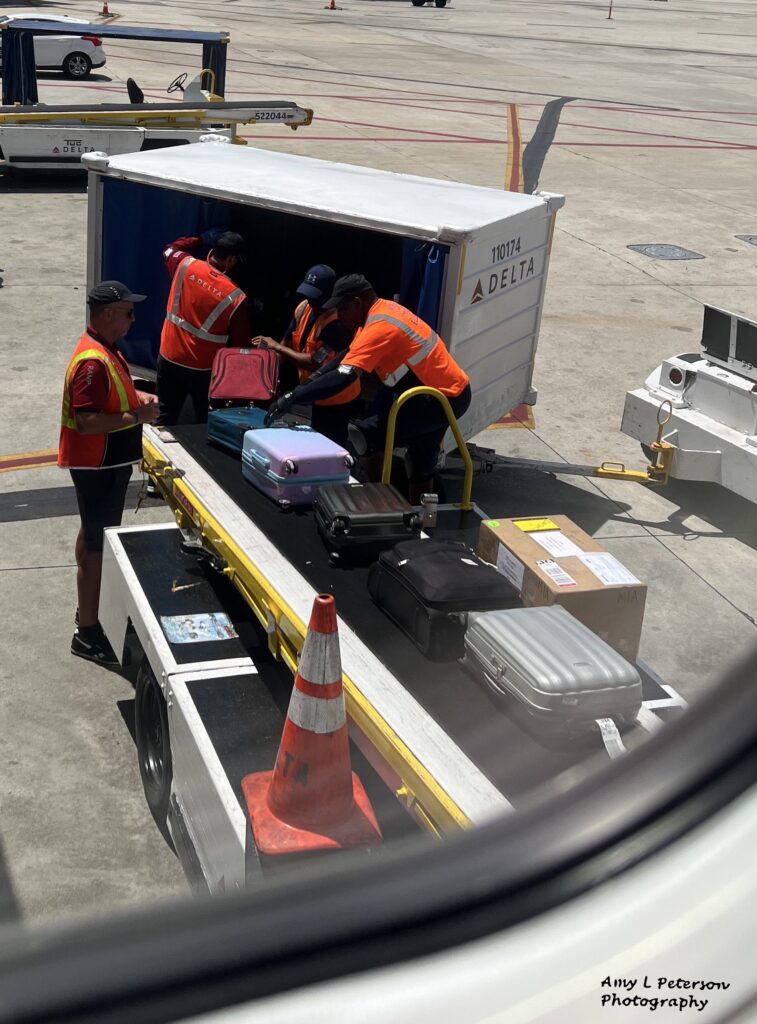
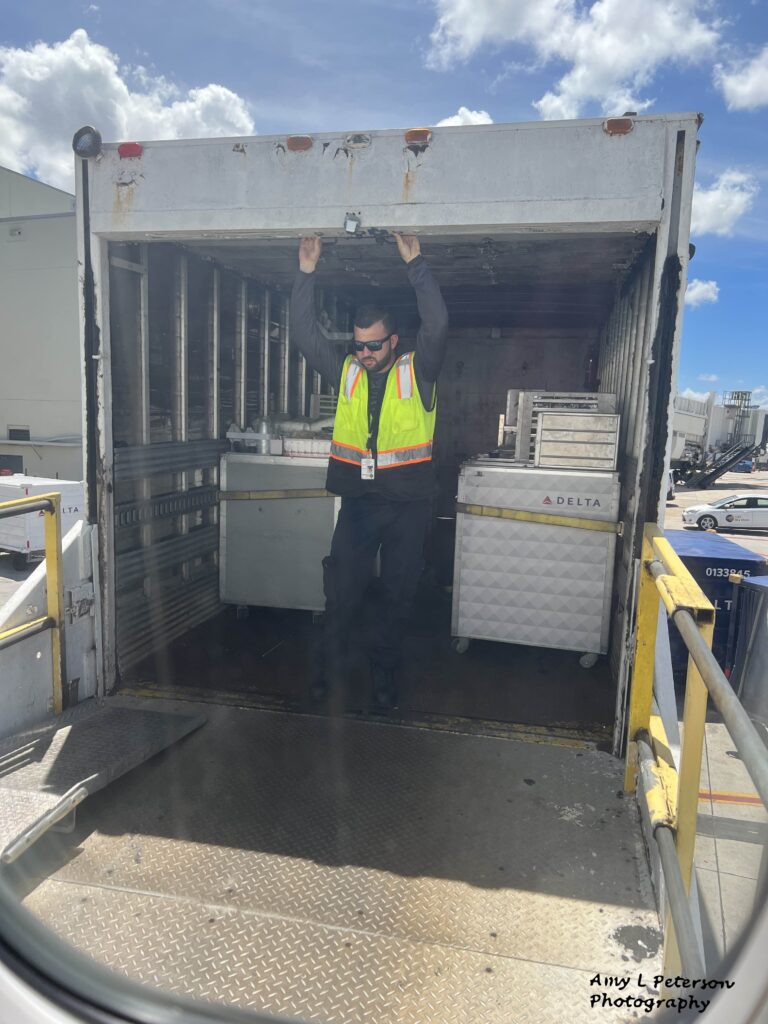
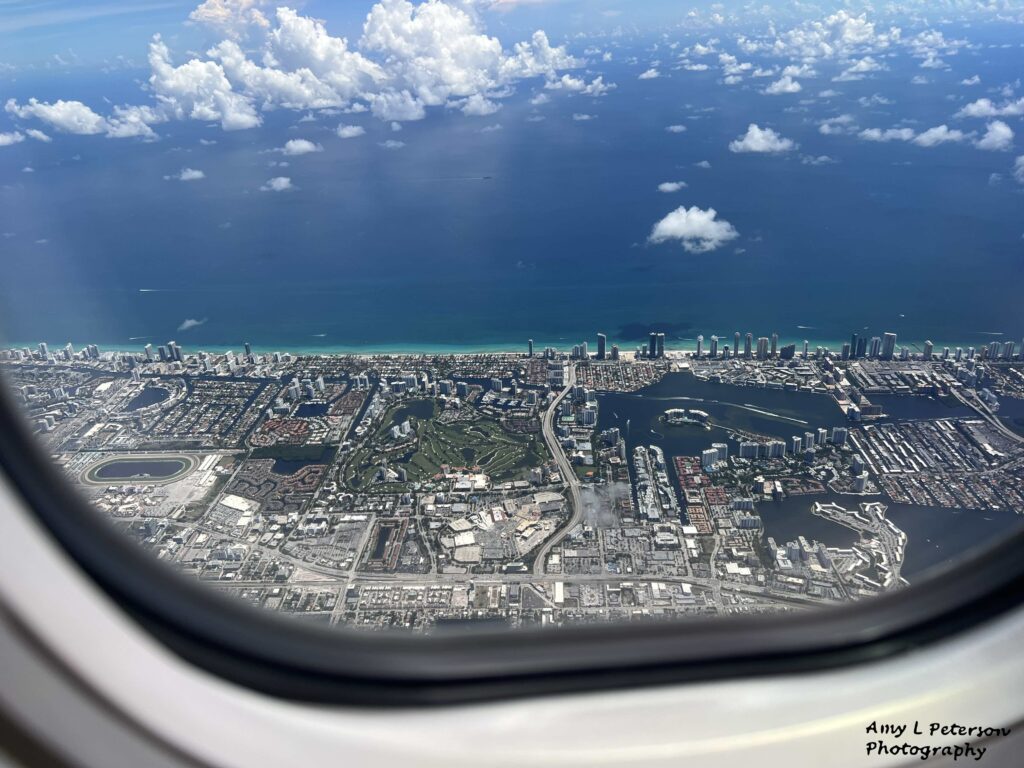
I’m always amazed to see the development along the shoreline of our ocean cities.
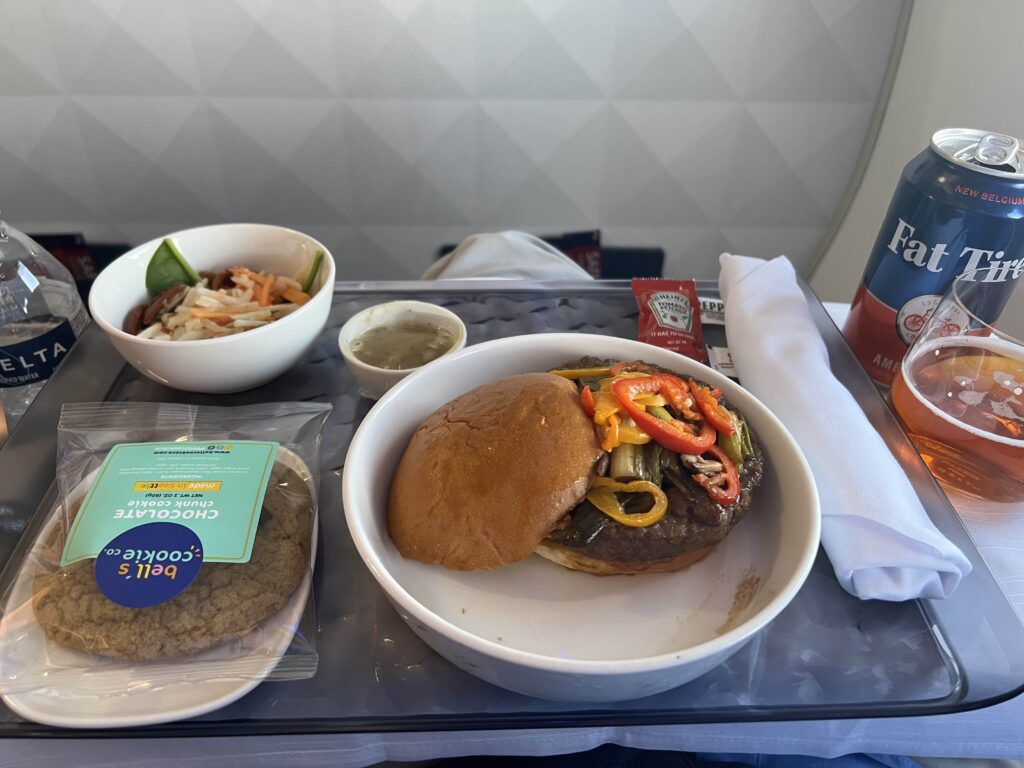
The flight from Miami to Detroit is about three hours, which was long enough to enjoy an Impossible Burger with a side of Fat Tire beer. A nap later, and I was ready to land and get our luggage (which we had in hand in less than 20 minutes, which we laughed about because time was not of the essence). We took a shuttle to the long-term parking lot, and drove the 1.5 hours to home in a bit of a daze.
As we rode, we reflected on our trip to Bolivia, and after we set aside the bureaucratic mess the Bolivian government has in place to get into their country and the extra time and money it took to leave Bolivia, we focused on the fact that we had experienced some absolutely amazing things — the jaguar, capybara, pink river dolphin, agouti, otter, seeing just over 50 different bird species, catching 11 different species of fish, and fishing at night in the Amazon. We had slow fishing days, but slow fishing allowed us to focus in on the birds and wildlife, the sounds, and the footprints in the sand.
And a shout out to some amazing people: a famous surgeon, Esteban and his wife, Sabina for rescuing us at the airport; Benjo for rescuing us several times; our two fantastic guides, Bismark and Raul for keeping us safe all week in the jungle; Jennifer and the cook staff at the lodge; and Memo, who kept the interests of guests at the forefront…except when it came to pancakes. We never did get pancakes. :} And a big thanks to the two pilots who got us from Santa Cruz to the jungle and back with only a pee break and a can of soda to carry them between trips, and the airline staff who made our flights to and from Michigan comfortable, and the understaffed workers at the airport who tried their best.
The final shout out goes to the Bolivian people who figured out how to preserve the 2.5 million acre reserve we fished and walked around, and the local people who allowed us to enjoy that incredible landscape. We are blessed to have experienced all of it.
